#a story told through that lens and living under such a culture
Note
I don't know if this is something that would be triggering to you, but just in case, be aware that jean m auel has a thing where all neaderthals are rapists and it's part of the culture that the girls have to submit even if it's violent and it hurts them and it's a pretty significant plot point (the lead never wanted to be in a relationship or have a baby, gets raped, gets pregnant, has to give the baby away, everything about it is traumatic to her).
Not a trigger as is but thanks for the headsup nonetheless. I can look past a lot of atrocity in fiction, provided it's not any sort of idealism on the part of the author. If it's a lens through which the story tries to tell itself, then I think, narratively, it could be neat, if I can get away with calling rape culture narratively neat...
#as godwins law as this is#if genocide was a staple of the primary narrative culture#a story told through that lens and living under such a culture#is very different from a story that tries to perpetuate or justify it
0 notes
Text
Vivid BAD SQUAD Main Story Summary
TL;DR: Two years ago, RAD WEEKEND ignited the fire of Vivid Street, especially two young singers, Shiraishi An and Shinonome Akito. They both vowed to one day surpass that legendary night, no matter how impossible others told them it was.
An struggled to find a worthy singing partner for a long time. One day, an anxious girl named Azusawa Kohane stumbled into Weekend Garage after getting lost. An sparked a passion inside of Kohane, and after realizing how exiting it was to sing with her, took the inexperienced girl as her partner. Akito, however, questioned the decision and challenged the pair to perform at an upcoming event.
Despite the pair's hard work, a jealous musician's interference with the sound system caused them to fail. Akito took the fall and lashed out at the duo, challenging their resolve. Through Miku, Len, and MEIKO's reassurance, Kohane discovered her true feelings and vowed to stay by An's side, chasing the same legendary night together.
However, Toya realized his resolve was the weakest out of all of them, since he was only pursuing street music to run away from classical music and his father. Akito punches him, and the two part ways. Worried about the sudden change, Kohane and An try their best to help Toya. Meanwhile, MEIKO helps Akito realize Toya's departure may mean more than meets the eye. Akito interrupts Toya's final goodbye to Weekend Garage and helps him realize it doesn't matter why he stands on stage, only that he wants to and is serious about it. The two make up, and Untitled takes the form of a song. Vivids and BAD DOGS decide to team up to chase RAD WEEKEND together, under the name Vivid BAD SQUAD.
Official English Youtube upload / Song (Ready Steady) / Animation

Chapter 0: An briefly narrates a flashback of her experience at RAD WEEKEND. In the present day, she chats with a customer of Weekend Garage about how she has yet to find the right partner, since none of the other musicians have the drive to surpass that legendary night. After, she goes to battle around Scramble Crossing, to which Kohane catches a glimpse of. Suddenly, An's phone lights up as she is transported to the SEKAI, a bewildered Kohane in tow. Miku, Len, and MEIKO introduce themselves and the SEKAI. An declares her dream to surpass RAD WEEKEND, but Kohane isn't sure if she has one. The two are then forced out of SEKAI with a vague feeling of determination.
Chapter 1: At school, Kohane admires her classmate Minori's drive to become an idol. She wonders if she'll be able to find a similar dream one day. Kohane goes to look for an album for her mom, but the only place that has it in-stock is in a back alley. She gets lost trying to walk back home and stumbles upon Vivid Street and Weekend Garage. She walks in to ask for directions, only to find An singing on the stage. She's super impressed by her, but runs away when An approaches.
Chapter 2: Once home, Kohane tries searching for the song An was singing, only for Miku to pop out of her phone and ask her to come to SEKAI again. Kohane doesn't, however. The next week, Minori comments on how Kohane has been humming that song ever since. She tells her about Weekend Garage, and the two bond over the power of live music. Kohane ends up going back to Weekend Garage that afternoon.
Chapter 3: Ken goes to buy coffee beans, leaving just An and Kohane in the cafe. The two formally introduce themselves to each other, and An explains the event culture of Vivid Street. Kohane asks if An could sing that song again, though after hearing Kohane praise her, An returns the request. Impressed, An asks if she would become her singing partner.
Chapter 4: Akito and Toya debrief after an event. Kotaro (simply called Musician at this time) praises them, even if he doubts their ability to surpass RAD WEEKEND. He asks if they've ever considered teaming up with An. Akito would consider it. Back at Weekend Garage, Kohane hesitates to accept An's offer. An thinks Kohane is great despite her lack of confidence, however: she'll always have her back, because that's what her dad and his partner did. Kohane decides to give singing a chance.
Then, Akito and Toya walk in and introduce themselves to Kohane. An explains how they're currently working towards the same dreams as the partnership BAD DOGS. She then introduces Kohane as her new singing partner. Upon learning of her lack of experience, Akito invites the two of them to perform at an upcoming event.
Chapter 5: An and Kohane accept the offer. After they leave, Toya questions why Akito did that. Learning that An had accepted a newbie like Kohane as her partner had made him question if she truly was serious about surpassing RAD WEEKEND, and that crushing them will prove this dream isn't for the half-hearted. Meanwhile, An and Kohane begin practicing for the event. When building their set list, they come across an Untitled song and are transported to a mysterious street.
Chapter 6: Miku brings An and Kohane to crase cafe with MEIKO to discuss the feelings behind SEKAI. Kohane questions if her feelings really could contribute to such a place. Suddenly, Len barges in after a fight with Rin, only to realize Kohane and An finally arrived. He questions where the other two are, to the girl's confusion. An realizes they need to go back to Weekend Garage and leaves. Len decides to go say hi to the others in the real world.
Chapter 7: The next day, An brings Kohane to practice on Vivid Street, much to the latter's horror. Despite her fear, the two end up doing alright. They also decide to name themselves Vivids, after the street they both love. Toya passes by, sparking nostalgia for his own early days. However, he's still thinking about Akito's comment on half-heartedness from before.
Chapter 8: BAD DOGS lights up another venue, leaving Kotaro bitterly jealous of them and An. Akito explains his drive to crush them and their "jokes" of surpassing RAD WEEKEND, but tells Kotaro to stay out of it. Len pops out of Akito's phone, but realizes now isn't the time to talk.
Later, Kohane and Toya run into each other on Vivid Street. Toya asks if Kohane is truly serious about surpassing RAD WEEKEND. She explains how she wasn't quite sure before, but because she loves standing next to An, she'll do whatever it takes. She also thanks him for the invitation to the event.
Chapter 9: The day of the event, Toya pulls Akito aside and explains how he thinks Kohane and An truly are serious about their dreams. Akito decides to give them a chance. The Vivid's show starts off strong, but partway through, Kotaro pulls the sound plug. An tries to recover, but Kohane freezes with anxiety. She apologizes after the event, but end up overhearing Akito yelling at Kotaro for his interference.
Chapter 10: Kotaro runs away upon An's confrontation. Akito decides to take the fall. He questions An and Kohane's resolve to do what it takes. Kohane ends up going to SEKAI afterwards to talk about what happened.
Chapter 11: Kohane doubts if she really is serious enough to chase An's dream. Len points out how much Kohane has changed in just a month, while Miku and MEIKO encourage her to keep trying to find her true feelings. What others say don't change who she is. Kohane resolves to tell An she wants to stay by her side, discovering her true feelings along the way. Meanwhile, An doubts her ability as a partner.
Chapter 12: Kohane enters Weekend Garage with rekindled determination and freshly-cut hair. An is overjoyed by Kohane's return, and the two decide to practice even harder than before to one day surpass RAD WEEKEND. BAD DOGS enter the cafe soon after. Kohane declares her determination to Akito and refuses to run away. Toya invites them to their next event that upcoming weekend. After the boys leave, Ken compliments Kohane and implies to an Akito's motivations are deeper than they seem.
Chapter 13: Toya arrives home late at night. His father comes into his room to berates him, telling Toya that he's wasting his time and that Akito is a bad influence. Toya knows that he's only performing street music to run away from classical, and that he's really the one with the weakest resolve. The day of the second event comes. Akito finally admits that the Vivids are truly serious about surpassing RAD WEEKEND. Suddenly, Toya tells Akito he's leaving BAD DOGS.
Chapter 14: Confused by the sudden change, Akito lashes out and punches Toya, and the two part ways for good. Meanwhile, Kohane and An visit SEKAI to tell the Virtual Singers the good news. Len reveals that the other two who formed the SEKAI are Akito and Toya, much to An's shock.
Akito bittersweetly remembers the first time he had met Toya, singing all alone on a street corner. He walks into Weekend Garage alone, worrying An and Kohane.
Chapter 15: The Vivids encounter a depressed Akito performing alone at an event, furthering their concern. The next day, Kohane runs into Toya at the CD shop, but doesn't get any solid answers over what happened. Suddenly, Kotaro pulls the Vivids aside and formally apologizes for messing up their first event, clearing Akito's name. The next day, An brings Toya to Kamiyama's courtyard to talk to Kohane.
Chapter 16: Kohane questions why Toya left street music, since he always looked like he was having so much fun singing. Toya never noticed that fact before. Kohane explains her own feelings of doubt, but knowing her true feelings are to stand next to An. Toya walks off.
Akito is still bothered by Toya's departure, no matter how hard he tries to focus on RAD WEEKEND instead. While trying to create a new set list, he accidentally stumbles upon Untitled. Len greets him and brings him to crase cafe. He talks to MEIKO and the others about his disagreement with Toya. Meanwhile, Toya enters Weekend Garage to say one final goodbye to Ken.
Chapter 17: MEIKO hands Akito a glass of oolong tea disguised as whiskey, explaining how things aren't always as they appear. She thinks there's something deeper to Toya's actions. Suddenly, Akito's phone rings with a call from Ken. Meanwhile, Toya begins to tell Ken, An, and Kohane the true reason he decide to leave BAD DOGS.
Chapter 18: The chapter begins with a flashback of Toya's father's harsh piano practices. Toya explains that these memories began to make him hate music, and that he only started street music to defy his father. Still, he's grateful to Akito for sharing his dream with him. He doesn't want to hold back his friend with his false resolve. Akito bursts through the doors of the cafe, having run all the way there from SEKAI.
Chapter 19: Akito tells Toya that he doesn't care why he ended up on the stage. He knows how serious about music Toya is, and that he's the only person Akito wants as his partner. Toya finally realizes that he's allowed to just do what he wants, regardless of the past. BAD DOGS officially re-forms. Now that all four of them have found their true feelings, Miku sends them into SEKAI.
Chapter 20: Miku asks if both Vivids and BAD DOGS will sing the song that took form together with her: Ready Steady. After realizing how well they sound working together, and how much farther they'll go united, An suggests teaming up for good. They combined their former unit names, along with a word of unity, to officially form Vivid BAD SQUAD.

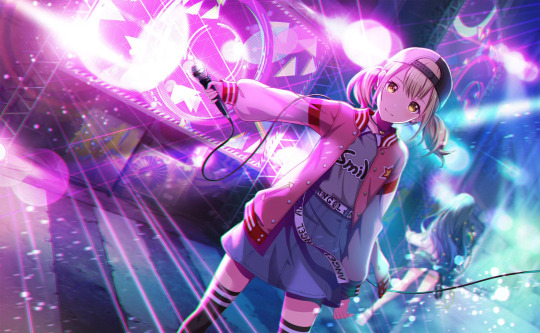

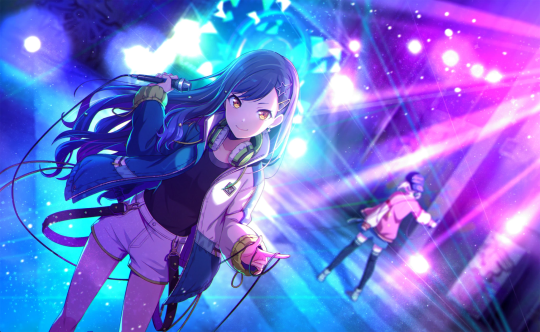
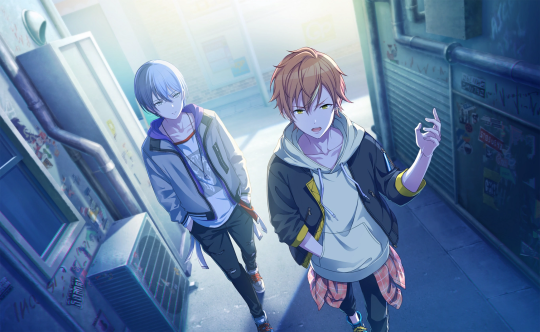
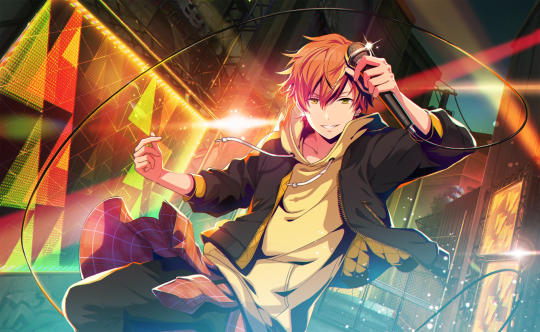

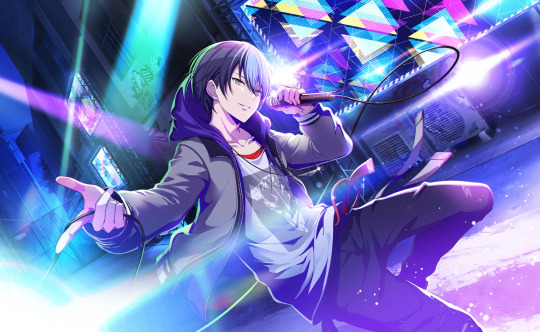
Virtual Singer Chapter 1 (Pre-Chapter 0): Len and Miku order coffee from MEIKO. MEIKO laughs at the kid's banter and offers them both a coffee jelly. Miku leaves to prepare for Kohane and An's arrival. Len is bummed he can't join Miku, but is still excited to help out MEIKO.
Virtual Singer Chapter 2 (After Chapter 6): Len talks about his excitement towards meeting An and Kohane, as well as his hope to meet Akito and Toya soon. Len orders a black coffee, no sugar or cream. He wants to act adult-like like that, though he denies the fact. He's doesn't like the coffee. Miku talks about how she switches up her coffee based on the day ahead, and that he doesn't have to force himself to do or like anything.
Virtual Singer Chapter 3 (non-specific timing): MEIKO runs into Rin while opening up shop and listens to her side of the argument with Len. She wants to apologize, but doesn't know how. MEIKO reassures her that Len wants to make up, too, and that she should just be honest. Rin runs off to find him.
Virtual Singer Chapter 4 (After Chapter 20): Vivid BAD SQUAD ask to use crase cafe's stage to practice since their usual spots are full. After reaching a split decision on a part, the four ask for Miku and MEIKO's advice. Suddenly, Rin and Len walk in and ask to join their practice, interrupting the argument.
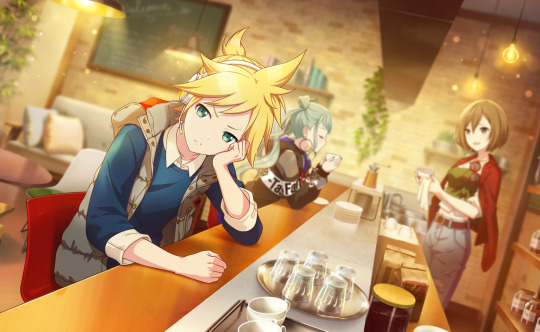



#project sekai#vivid bad squad#main story#azusawa kohane#shiraishi an#shinonome akito#aoyagi toya#vbs miku#vbs meiko#vbs len#vbs rin#shiraishi ken#mita kotaro#aoyagi harumichi#minori appears in the first two chapters btw!#and rui and tsukasa are mentioned in chapter 15
38 notes
·
View notes
Text
History: The Many Lives of Gaza - A Peek Into Palestinian Daily Life
— Mariam Amini | Monday January 22, 2024
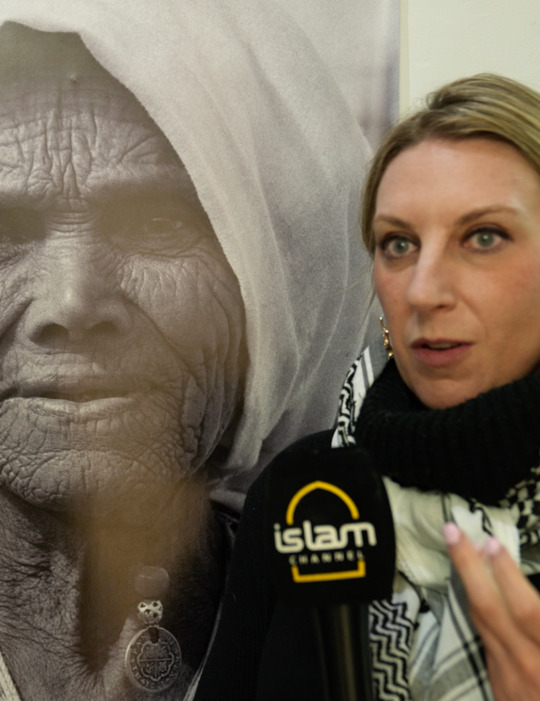
If a picture is worth a thousand words, The Many Lives of Gaza exhibition could write several trilogies.
Displayed at the Bermondsey Project Space earlier this month, the exhibition told the tale of Palestine through a nostalgic Gazan lens.
Prior to the Nakba in 1948, meaning “catastrophe” in Arabic, the Gaza Strip was an area of fertile land and abundance, composed of vibrant fishing towns and villages.
Following this upheaval, some 750,000 Palestinians were displaced. Zionist militias killed at least 15,000 local residents, ethnically cleansing more than 500 towns. In Gaza alone, some 130,000 refugees arrived, having fled ransacked villages.
The Many Lives of Gaza captures this aftermath vividly, making use of multiple media forms.
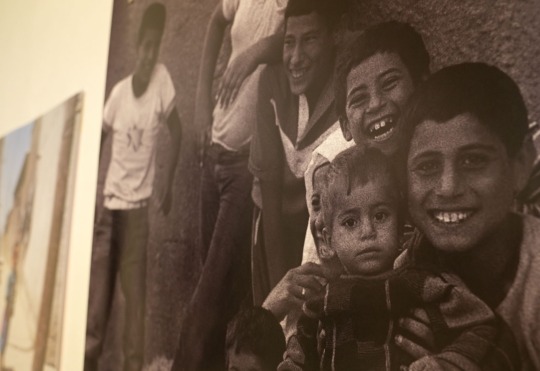
A group of Palestinian children laughing and grinning
Archived photographs from the Palestinian Museum in the West Bank display the reality of refugee camps. Video interviews with survivors relay anecdotes of the past.
Pieces by Palestinian artists and infographics also dot the walls, letting visitors engage with key facts and figures.
“It’s this combination of very heartfelt photography but also hardcore facts - I think that’s a strength of the exhibition,” says Jordanian Filipina-American writer and editor Malu Halasa.
“It’s important to put Gaza into perspective, and to think about it differently. Looking at the news, you hear about what’s happening in terms of the war, but it’s rare that we’re hearing Gazan voices or seeing Gazan faces.”
According to Halasa, the key to understanding the real context lies in creative spaces. “The amplification of Palestinian lives, voices, experiences is very important. In culture and art, you learn more about people. These are platforms where people speak for themselves instead of having the intermediary of the news or an academic.”
For exhibition co-curator Dr Meg Peterson, this resonates. “There’s an educational element to it. “[We’re] trying to uncover the layers so people don’t just see images of conflict and destruction. It’s also seeing images of life and joy - that side of Gaza.”
“There’s a much deeper story behind the images. People want to know more about the people who are captured, but unfortunately we just don’t know where they are.”
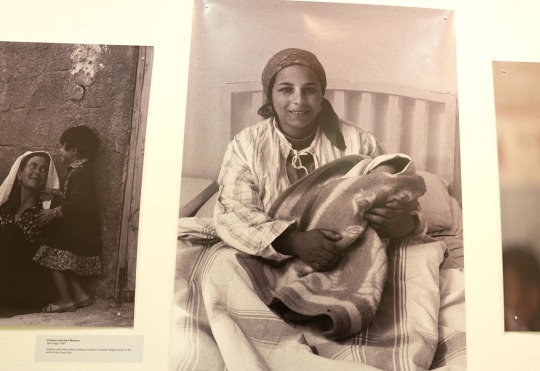
A proud new Palestinian mother cradling her newborn
Through expression and emotion alone, Peterson hopes to connect to people’s humanity. Her main message is one of “solidarity and action”.
“There’s so much that you can do on a small scale to make a really big difference, and everyone should feel a responsibility to be a part of that change.”
This is a cause of special significance for co-curator Nadine Aranki, who is herself Palestinian. Having grown up in Ramallah in the occupied West Bank, the reality of life under occupation is especially close to home.
“It’s like we are undergoing slow mass murder. There are many justifications out there by the Israeli propaganda about why they are committing this genocide. In the West Bank, we have also seen a rise of Israeli soldiers killing people.”
Aranki seeks to dispel this dehumanisation and violence by drawing focus onto the subtle and everyday. “We try to tell the story of the daily life of Palestinians in Gaza. Visitors are really fascinated by this context. It’s giving them new information.”
As for her wishes for the future, Aranki believes in the power of art to make change.
“This exhibition is really important at this specific moment of time. It’s trying to break through and shift the narrative of what it means to be Palestinian.”
“A lot of the time, this is presented as a complicated question, but it’s not. It’s very simple. We want a ceasefire. We want our people to live.”
#Forever Palestine 🇵🇸#Gaza Genocide#History#Illegal Regime of God’s Fucked-up Cursed People#Immigrated Zionist 🐖 Cunts#The Bastard Child of the United States 🇺🇸 & the West 🇪🇺#Forever Palestinians 🇵🇸#Hell with Illegal Isra-hell
2 notes
·
View notes
Text
By: Douglas Murray
Published: Apr 30, 2022
There are many ways to fracture a people. But one of the best is to destroy all the remaining ties that bind them. To persuade them that to the extent they have anything of their own, it is not very special, and in the final analysis, hardly worth preserving. This is a process that has gone on across the western world for over a generation: a remorseless, daily assault on everything that most of us were brought up to believe was good about ourselves.
Take our national heroes – the people who used to form the epicentre of our feelings of national pride. Twenty years ago, Winston Churchill easily won the BBC’s competition to find out who the nation thought to be the Greatest Briton. Today whenever the BBC runs a piece about Churchill it includes the ‘case for the prosecution’: a set of tendentious and fallacious arguments now frequently made against him. This has consequences. When the outburst of iconoclasm began in the summer of 2020 after the murder of George Floyd, Churchill’s statue was one of the first to be assaulted. Indeed it was attacked so often that the statue in Parliament Square was boxed up, and only got unboxed when the French President arrived in London for the day.
It isn’t just Churchill who gets this treatment. Almost everyone in our history does. Again and again, largely due to importing some of the worst ideas in modern American life, we are told that we need to scour our past and purge whatever fails to satisfy our current urges.
Two years ago the Mayor of London, Sadiq Khan, set up a Robespierrean ‘Commission for Diversity in the Public Realm’: a commission made up of people who all seem to share a wholly negative view of these islands, and one of whom was known for having once shouted at Her Majesty the Queen. And yet that commission is meant to decide what we are allowed to keep of our history. And not only what should come down, but what should go up in its place. Among the suggestions for more appropriate modern statuary are a memorial to the murdered teenager Stephen Lawrence, a tribute to the Windrush generation and a new National Museum of Slavery. Only last week it transpired that a London council is planning to rebrand William Gladstone Park, because the great prime minister’s family stands accused of benefiting from the slave trade. The front-runners for alternative names for the place include Diane Abbott Park.
Where once our national story was one of pride and heroism it has come to be looked at solely through the reductive, simplistic lens of racism, slavery and colonialism. Our civil servants and public appointees must demonstrate a commitment to ‘Diversity, Inclusion and Equity’ in order even to be allowed to work. Every political institution, including the House of Lords, is suffused with the same new dogma. Likewise every cultural institution, from the National Trust and Kew Gardens to the British Library, Tate and Globe theatre has decided to ‘decolonise’ – which means stripping us of our history or reframing it in an implacably negative light.
All of this has come across our culture like a flood – in the main, precisely because it is imported from America, where a cultural revolution is under way which consists of an assault on all of the foundations of the country. This includes a project of the New York Times which seeks to move the founding date of the American Republic from 1776 to 1619: the year in question being when slaves were first brought into the country. The non-historian who led this sloppy effort has been awarded a Pulitzer prize and chairs at American universities for her efforts. The attempt, like the one that’s going on in Britain, is to pretend that our nations were born in sin, everyone else into Edenic innocence.
Anybody found guilty of living in American history is torn down in a similarly remorseless way, from Christopher Columbus to Theodore Roosevelt. Absolutely no one is safe. The Founding Fathers have been rewritten. A couple of generations back, few Americans may have known that Thomas Jefferson owned slaves. Today it is almost the only thing anyone knows about him. Again, this has consequences. Last autumn the statue of Jefferson that had stood in New York City Hall since 1833 was ignominiously removed, boxed up and wheeled out the back door. According to one council member Jefferson no longer represents US ‘values’.
It is hard to think of anyone from two centuries ago who would. But in the relentless war on everything to do with western history at least the tactics are now clear. Aristotle and Plato have been denounced for not having 2022’s views on race. Similarly all the Enlightenment philosophers, so that David Hume’s name has come off buildings in Scotland. The charges are always the same: having views not exactly in line with those of the 21st century, being complicit in the slave trade, being complicit in colonialism. Or just being alive while these things were going on. When the evidence isn’t there, the anti-western ‘scholars’ of our day have shown themselves perfectly willing simply to invent it.
What are the effects of this? Among much else, it is not remotely clear why societies which have such terrible pasts should ever rouse themselves to do anything in the present. Last year the US Ambassador to the United Nations used the occasion of the UN’s International Day for the Elimination of Racial Discrimination to denounce America for its ‘original sin’. She talked about the killing of George Floyd and presented a recent shooting at a spa (which had nothing to do with race) as an example of the ongoing racism in America. Towards the end of her speech, in passing, she remembered to mention the internment of around one million Uighur Muslims by the Chinese Communist party. Funnily enough, China’s representative was up next. ‘In an exceptional case’ the Chinese Communist representative said furiously, the American had actually ‘admitted to her country’s ignoble human rights record’, and so she had no right ‘to get on a high horse and tell other countries what to do’.
Until Russia invaded Ukraine in February this was the default presumption of the competitors and opponents of the western powers: that our countries had so deracinated themselves, so scourged themselves for historic sins and so denuded themselves of any decent approach towards their own history that they were unlikely to summon up the courage to stand up for themselves, let alone for their allies.
In fact Vladimir Putin’s war has done something to revive a sense of purpose and solidarity in the West. In one swoop the 30-year-old question about the point of Nato has been answered. When Sweden and other countries join the alliance later this year it will be cemented further. Even countries such as Germany have shown themselves willing to do highly unusual things, like actually spend money on defence now a real threat has re-emerged in their neighbourhood.
But the idea that Russian tanks rolling into Ukraine will solve the West’s problems or clarify our minds already looks like a forlorn hope. In a poll taken last month almost half of Americans said that if their country was invaded as Ukraine’s has been they would flee the country and not stay around and fight. Worst was that among 18- to 34-year-olds only 45 per cent said they would remain and fight, while 48 per cent said they would flee.
But why would they not? Who would stay and fight for a country that you have been told is rotten from the start, has no legitimate heroes and is riddled through even in the present day by ‘white supremacy’ and ‘institutional racism’? It is the same in other countries. The Europeans may have remembered that you have to spend money if you want to be able to defend yourselves. But more important still is to have a sense that you have something that is worth defending.
Putin, the Chinese Communist party and others have looked at the West in recent years and seen these increasingly fractious, riven and self-lacerating societies. Each has done what they can both online and off to exacerbate this tendency. They think we are awful and irredeemable, and they are delighted if large swathes of our populations and political and cultural figures agree with them. Just last week one of the CCP’s propaganda papers pumped an image around Twitter of Uncle Sam behind the Oval Office desk, surrounded by corpses. The caption accused America of racism and family separations at the border. Perhaps the people of Xinjiang province have something to say about the sincerity of that attack.
Of course, unity is not the only thing you need in a nation, as Putin has demonstrated. But it’s not nothing either, as President Volodymyr Zelensky and the Ukrainian people have shown. The key question any country and any culture has to answer is whether it wants to keep going. Most of the western powers have been told in recent years that we should keep going in order to find our way to greater equity, equality, diversity and a whole pile of other meaningless guff, including ‘diversity’: an entirely anti-western concept from its foundations.
The war in Ukraine may be just the first test of the western alliance. It is clear that in the 21st century the CCP is going to present a much more substantial challenge than Putin ever could. Will the West be willing to rise to that challenge? Only if we regain the sense that we have something worth preserving. And the knowledge we had in the Cold War that free western societies deserve to win out, not because it is in our interests to do so, but because we are better than the alternatives.
How some people will shudder at the idea of even expressing that. But it is true. It is why the countries that most beat themselves up about their pasts are the countries that the world most wants to come to. We must be doing something right today, which means we have must have done something right in our past. The rest of the world recognises that fact by its footfall. It is time we started to recognise that truth ourselves.
[ Via: https://archive.is/dP2sQ ]
==
People actually risk their lives for the opportunity to participate in the western tradition. While smoothbrains who, by accident of birth, are fortunate to be able to take living there for granted, never have to contemplate the stories of the former group, and so say stupid things like "well, we're no better than [theocratic regime]/[communist dictatorship]/[poverty-stricken hellhole]."
The irony of course is that this sort of self-critique and self-flagellation is only possible among western countries. In any other social arrangement it would be, at best, ignored, at worst, grounds for eliminating you from it.
#Douglas Murray#The War on the West#human rights#self flagellation#inverted exceptionalism#self hatred#navel gazing#first world problems#religion is a mental illness
7 notes
·
View notes
Note
Hello....Can I ask your top 10 favorite anime (can be series or movies) that you've finished? And why do you love them? Thanks if you want to answer....
Sure, I'll just grab the top of my MyAnimeLi-- actually, hmm, can I trust past me's ratings? Does current me remember how past me was scoring these?
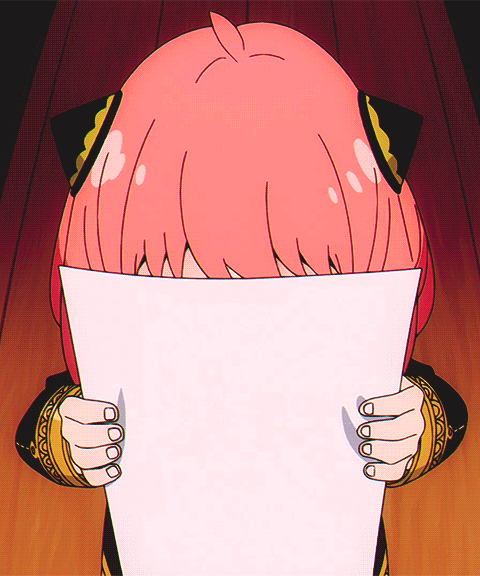
WE’LL DO IT LIVE! In no particular order, and under the cut to avoid blasting yinz with a wall-o-text:
Legend of the Galactic Heroes: Okay, so I fully get people who don't want to slog through this because it can be painfully slow and dry, but that's what drew me to it. In terms of world-building and showing your work, this is one of the best sci-fi political dramas you'll find in any medium. It's also great if you pay attention US current events and want to be even MORE worried about the decline of the republic.
Fullmetal Alchemist Brotherhood: A wild ride from start to finish, with an amazing cast and well-written escalation as evil plots materialize. Great balance of action, drama, and comedy. I'm struggling to think of another show that lasted four or more cours where I didn't, at any point, think, "Huh, it's really dragging lately." Fond memories of watching this in anime club, too.
Patlabor 2: The Movie: All of Patlabor is pretty great, and you can jump between the TV series and the OVAs/movies depending on what kind of tone you want in your giant robot police procedural. The second movie is a gripping political thriller that asks some very big and scary questions about the nature of peace and power; as with LoGH, it’s one of those that maybe you wanna hold off on if current events are stressful.
Macross Plus: It distills all of the Macross essentials into a tidy two-hour package with high-quality animation, lovely Yoko Kanno soundtrack, and one of the most gorgeous mechs ever to grace the screen, the YF-19. Virtual idol Sharon Apple gets bonus points for the effort made to make her music not sound contemporary. Also makes it painfully clear how much Japan loves Top Gun for whatever reason.
Chihayafuru: Completed in that I’ve watched what’s been adapted. This is somehow an honest-to-goodness sports anime which effectively hits all the tropes, surrounds the MCs (who are huge dorks themselves) with a quirky ensemble cast, and has introduced audiences to an incredibly Japanese cultural curiosity, competitive Hyakunin Isshu karuta. Shout-out to the Kitakyushu Manga Museum for finally giving me the opportunity to buy a plush Snowmaru.
Mobile Suit Gundam: I’m always going to have a soft spot for Wing; it was my first and I’ve yet to run into a Wing mech that I don’t instinctively like. But in terms of world and characters, the OG is where it’s at. Massive appreciation for the depth of the story being told in what was supposed to just be a toy commercial for Mr. Bandai in 19-freakin-79. Amuro and Char have grown to be larger-than-life and there’s just something comforting about seeing and hearing them whenever something new pops up. (Yes, even the damn McDonald’s commercial that Ikeda Shuuichi was paid real money to do.)
Psycho-Pass: Continuing with the theme of “here are some uncomfortable truths about modern society and we’re not being subtle,” we have Akane, the mythical good cop in a sea of actual violent criminals. Watching her slowly learn how the world works, hate it, deal with it, and then face it on her own terms -- chef’s kiss. Side note, shout-out to the time @lindoreda and I went to see the stage play, and I was one of the few dudes there, and we could feel the room collectively inhale when Kubota Yuki took his shirt off.
Flag: Flag is told from the perspective of a photojournalist embedded within a UN task force carrying out peacekeeping operations in generic central Asian country. And when I say “from her perspective,” I mean that literally, as almost the entire show is seen through her camera lens with occasional side-views from another journalist’s POV or onboard camera footage during missions. It’s a unique and painfully contemporary (although it’s, what, over 15 now?) mecha that I need to rewatch sometime.
Haikyuu!!: I’m giving Haikyuu a nod over some other excellent contenders (Kuroko and Daiya come immediately to mind) because it has all the elements I expect -- lovable cast, action-packed matches, special attacks that straddle the line of unbelievability -- plus a selfish intangible. I can cosplay Asahi without a wig and a quick shave, because manbun has been my default for years. It’s nice having a show I like where I can just take one look at a dude and be like, yup, I can wear that to cons until I start turning gray.
Shinkalion: I WOULD BE REMISS NOT TO MENTION THE SINGLE MOST IMPORTANT TRANSFORMING-BULLET-TRAIN FRANCHISE OF MY LIFETIME, WHICH IS A TOY COMMERCIAL HIDDEN WITHIN THE STORY OF A BUNCH OF KIDS CONFRONTING BIG PROBLEMS AND FINDING SOLUTIONS THAT MAKE ALL THE ADULTS IN THE ROOM THINK, YEAH, WE CAN TRUST THEM WITH THE FUTURE AND THE FUTURE IS NOW.
14 notes
·
View notes
Text
06: The Old Stuff
“There is no peculiar merit in ancient things, but there is merit in integrity, and integrity entails the keeping together of the parts of any whole, and if these parts are scattered throughout time, then the maintenance of integrity entails a knowledge, a memory, of ancient things. …. To think, feel or act as though the past is done with, is equivalent to believing that a railway station through which our train has just passed, only existed for as long as our train was in it.”
Hi folks!
We are back today with another guided prompt. The task for this week is to unpack the quote listed above. Now, I have always been a fan of quotes and uncovering the deeper meaning of things. I am going to put on my glasses, play some smooth jazz in the background, and sip a warm tea as I channel my inner historian to unpack this quote.
The first concept states, “there is no peculiar merit in ancient things, but there is merit in integrity, and integrity entails the keeping together of the parts of any whole.” I interpret this to mean that just because an item or concept is old, it does not mean it should be valued or trusted. Rather, there is value in the integrity. An example of this is walking through an ancient artifacts exhibit and questioning why they would have included such peculiar pieces. These pieces may be irrelevant, but they are the vessel through which a bigger story is told.
Diving into the second concept, “if these parts are scattered throughout time, then the maintenance of integrity entails a knowledge, a memory, of ancient things,” demonstrates the necessity of interpreting under a collective lens rather than in individual concepts. Preserving integrity requires the acknowledgement of what came before.
The quote concludes with the analogy of a train station: “To think, feel or act as though the past is done with, is equivalent to believing that a railway station through which our train has just passed, only existed for as long as our train was in it.” It highlights that interconnectedness is experienced when we do not acknowledge our roots. As a result, we may find our future to be weary.
I have never been a history buff; however, I can appreciate the value it has in our lives. History is a valuable tool to remind us of our past mistakes and guide us in our futures (Hooykaas, 2024). Although we may not regularly observe large, quantifiable changes of our natural world, it is everchanging. As mentioned in the readings for this week, climate change is an area of great historical content. Last term, I had taken a course which focused on climate change. We studied our natural world and the different areas that our warming climate has impacted. One of the lessons was dedicated to the history of climate change. I found it fascinating that the imprint of thousands of years is held in the sediment of rock and on our ocean floor. These natural time capsules hold great value and help our modern society understand the past (Hooykaas, 2024). In interpreting these findings, we are actively forming a community to prepare for future generations (Beck et al., 2018).
Reflecting upon history, two extremes exist. Our history contains incredible accomplishments and seismic evolution however, it is at a price. Thousands of lives have been unnecessarily lost and ecosystems destroyed but through it all, there is a lesson to be learned. As the quote highlights, there is value in recognizing the past, not for the age but for maintaining integrity to make sense of the present.
Check out my reblog for this week to find a really cool resource for tree dating and the historical importance this area of study has!
Beck, L., Cable, T. T., & Knudson, D. M. (2018). Interpreting cultural and natural heritage: for a better world. Sagamore Venture.
Hooykaas, A. (2024). Unit 6: Nature interpretation through history. University of Guelph. https://courselink.uoguelph.ca/d2l/le/content/858004/viewContent/3640020/View
1 note
·
View note
Text
Art, AI, and the Future: Embracing the Voice of Underrepresented Cultures
Have you ever pondered what the future would look like if Da Vinci had an AI assistant? Or if the rich tapestry of art history was more inclusive of cultures often brushed under the proverbial rug? Dive in with me, as we intertwine these riveting concepts and journey through an alternate perspective on art, AI, culture, and the underrepresented.

The Strokes of Time: A Glimpse into Art History
Rewind a few centuries back. Artists like Van Gogh and Picasso were making waves in the art world. Their innovative techniques, unique perspectives, and unfiltered emotions were etched onto canvases. But how many know about Zubeida Agha, a pioneer of modernist painting from Pakistan? Or the mystic Aboriginal art that tells tales of dreamtimes and ancestral beings?

A Cultural Revolution in the AI Era
Picture this: an AI digging deep into forgotten or undiscovered troves of artistic wonders from underrepresented cultures. The potential for AIs to highlight marginalized voices, offer new interpretations, and restore forgotten masterpieces is monumental. But it's not just about excavating the past. AI tools can provide platforms for living artists from these cultures to shine, to weave their stories, and to challenge mainstream art norms.

AI: The New Muse or Adversary?
There’s a whispered fear: AI might one day replace human creativity. Yet, when viewed through a different lens, could AI serve as the bridge between ancient cultures and modern interpretation? Imagine an AI creating art inspired by the detailed carvings of African masks or the intricate patterns of Native American pottery. Instead of an adversary, AI could be the collaborator artists have been waiting for.

The Voice of the Underrepresented: Not a Whisper, But a Roar
In a globalized world where every voice yearns to be heard, it's vital to amplify those from corners often dimmed by dominant cultures. From the murals of Mexican streets to the rhythmic dance of the Maoris, each tells a tale of resilience, history, and identity. When combined with AI's vast potential, the voice of the underrepresented won’t be a mere whisper but a roaring call, challenging the art world's status quo.

A New Dawn in Art and Culture
In marrying art history with AI, and by rooting it deeply within the essence of underrepresented cultures, we aren't just looking at paintings or sculptures. We're envisioning a world where stories from every corner are told, interpreted, and celebrated. A world where the dance between man, machine, and culture paints a future more vivid and inclusive than ever before.

Stay curious, stay informed, and most importantly, never let art be bound by the confines of history or technology. For in the blend of tradition and future lies the beauty of our global tapestry.
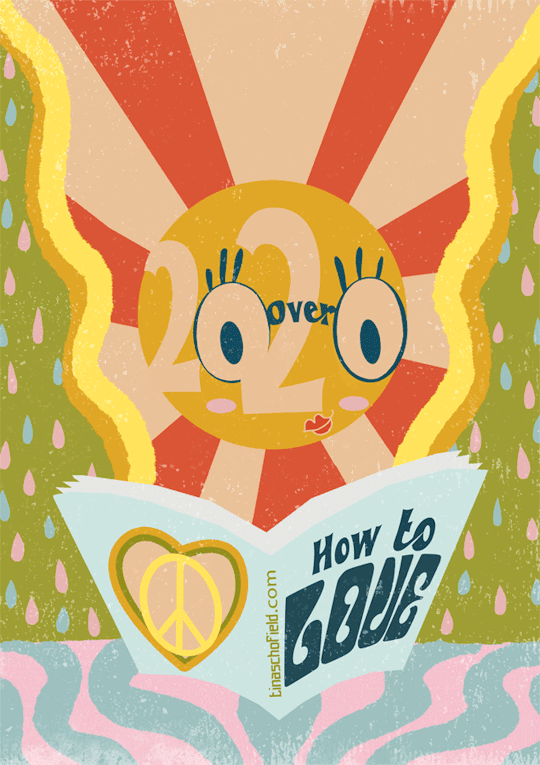
#AIArtFusion#CulturalCode#ArtHistoryReimagined#AIDigsDeep#BeyondTheCanvas#DigitalDreamtimes#AIUntoldStories#RisingVoicesInArt#TechMeetsTradition#CulturalCollabAIEchoesOfTheUnheardBrushstrokesAndBytesAIForAllCulturesRedefiningArtBoundariesPaletteOfTheFuture#artificial intelligence#art
0 notes
Note
LMK fandom: Oh, what do we do about this guy who has nothing but hurt Xiaotian, tried to replace Sun Wukong and his crew, hurt Tripitaka and ordered servants to cannibalize a monkey? Oh I know! We’ll turn him into our little meow meow~ he’s so innocent and Sun Wukong is obviously the villain!
What doesn’t help is this idea is perpetuated by multiple fan fic writers and artists for some reason. Especially some aus they make that turn SWK into a bastard for the sake of the story rather than considering cultural context and thinking they should be respectful.
And almost everyone lets them get away with it just because the art or fanfic is good and they get so popular that no one can point what is actually wrong without feeling like they’re going to get attacked.
I'm starting to feel like my blog is the one anons go to specifically to vent their frustrations about the Six Eared Macaque in his lego monkey show form & the associated fandom lmao. But I guess this makes sense, as I’ve had fun quasi-dragging him before & will in fact use this anon submission as an opportunity to have my own, to put it academically, bitch fest about not just this fandom's favorite protagonist-traumatizing meow meow, but about the way villains are often treated in not just fanon, but increasingly in canon works as well. But same policy as with the last anon; I'll post my opinions below the cut, and as fandoms love to say, don’t like don't read if you don't want to see me dunking on the six eared simian & common fandom tendencies towards villains.
Oh man I would say where would you even begin with this but anon you’ve pretty much started yourself with my main gripe with a lot of ways that the Six-Eared Macaque is portrayed in fandom; there seems to be this unspoken agreement that his acts of violence towards Sun Wukong, Qi Xioatian, and Qi Xioatian’s loved ones are either to be framed as somewhat or totally justified, to be immediately forgiven/excused, or to simply & completely be ignored. Like friends maybe this is just me not seeing the proper posts but while the fandom is inundated with art and fanfics of Macaque as a generally decent individual & a true member of team good guy, I have yet to see one person address the fact that this monkey literally kidnapped & mind-controlled Xiaotian’s best friend and father figures & forced them to brutalize Xiaotian while ol’ Six Ear looked on and laughed (X_X). Like this kind of fandom villain treatment is definitely not something that’s solely at work for Monkie Kid, but it is kind of nutty how fandoms will swing between yelling that people should be allowed to like villains without even mild critique, and then will just flat-out not address the villainous behavior, and will even bend over backwards to frame even characters who committed genocide as just poor innocent widdle victims who need a hug. At its worst, I’ve even seen tons of people in a fandom get really angry at other people who don’t like a villain, and will even start accusing those people of hating real-life mentally disabled or abused individuals all because they don’t like the fandom’s favorite literal war criminal. The Monkie Kid fandom is FAR more chill & better than a lot of other fandoms I’ve come across in that regard, but that is an exceedingly low bar, & the tendency to woobify certain kinds of villains-- as with Macaque and the extreme emphasis on his bad boy/sad boy thing--is very much at work.
I’ve also talked before about a kind of monoculturalization of certain character interpretations and story beats in fandoms, and one of the more popular ones that seems to be applied to Macaque a lot is the “hero actually bad, villain actually good” cliche, as observable from the general fandom assumption that Mr. Six-Ears he wasn’t even slightly lying or remembering things through a rose-tinted or skewed lens when he gave his version of his and Sun Wukong’s past. Like at this point it seems the possibility that people WILL NOT even consider is that Sun Wukong never did & still doesn't care that much about the Six Eared Macaque (in JTTW they weren’t sworn brothers & in Monkie Kid the only thing the monkey king really said to Macaque before attacking him was a pretty contemptuous "Aren't you ever going to get sick of living under my shadow?," & responds to his "beloved friend" getting blown up with "You did good, bud" to Qi Xiaotian, who did the exploding), or that their original fight may in fact have mostly been instigated by Macaque. After all, to repeat what this anon summarized & what I've said before about their original JTTW context (& in an example of the things that do feel like it's often lost in translation) is that the Six Ear Macaque was a villain not just because he beat up the Tang Monk, but because he wanted to take over Sun Wukong's entire life and identity so he could have all that glory, prestige, and power for himself. To quote the macaque himself from the Anthony C. Yu translation, "I struck the T'ang monk and I took the luggage...precisely because I want to go to the West all by myself to ask Buddha for the scriptures. When I deliver them to the Land of the East, it will be my success and no one else's. Those people of the South Jambudvipa Continent will honor me then as their patriarch and my fame will last for all posterity." And in order to do this, the Six Eared Macaque had apparently made Sun Wukong's "little ones," his monkey family, his captives through either trickery or force, and gotten a number of them to take on the appearance of Tang Sanzang and the other pilgrims. It's also made clear that in very direct contrast to Sun Wukong, he doesn't care about these monkeys beyond how they might serve him. In fact, after Sha Wujing kills the monkey posing as him the Six Eared Macaque not only all but immediately replaces him with another, but also "told his little ones to have the dead monkey skinned. Then his meat was taken to be fried and served as food along with coconut and grape wines." So this monkey is not only willing to risk the lives of a lot of other monkeys for his own personal benefit, but is also a literal cannibal. And yes yes, I know a lot of people have argued that Monkie Kid shouldn't be considered a direct sequel to JTTW & that's fair enough (for example, Sun Wukong probably shouldn't be smashing anyone into a meat patty in a children's cartoon lol). And of course, it needs to be noted that there are a buttload of really out there & really cursed pieces of media based on JTTW & that were created in China. Yet the above description is the oft-ignored in the west original facet of the Six Eared Macaque's character. And it is this selfishness, entitlement, and treatment of other individuals as tools for his own self-serving ends that is, from where I’m standing, still very much present in Monkie Kid. Like besides repeatedly going out of his way to physically and psychologically traumatize Xioatian, with the last episode Macaque seemed to be going right back to his manipulative ways. I’ve seen people frame their last conversation as Macaque softening to Xioatian a little bit, but personally that read a lot more like that common tactic among abusers where even after they’ve hurt you they’ll dangle something you want or need over your head (in Macaque’s case, the promise of desperately needed training and information about a serious looming threat), with the implication that you’ll only get it if you do what they want you to, such as, in this case, Xioatian going back to Macaque as his student even after having been so terribly hurt by this monkey, which would give Macaque power over Xiaotian and probably Sun Wukong as a result. And it is this violence and manipulation that it seems the fandom at large has tacitly decided shouldn’t even be addressed, instead leaning more towards a (and this is an exaggeration) “Six-Eared Macaque my poor meow meow Sun Wukong has always been bad & has always been wrong about literally everything” reading.
And while it is the case that I am not Chinese and feel that as such it would be best left to someone who actually comes from that background to provide more context into how common interpretations of the Six Eared Macaque from China may clash really badly with the stuff the western fandom creates, it also must be noted that, as much as we all want to have fun in fandom & in spite of all the out-there versions of JTTW from China, we westerners should recognize that there is a very long and very ugly history of western countries stripping other cultures’ important religious and literary works for parts & mashing them into their own thing while implying or even insisting that what they present provides a true understanding of the original piece. And while I trust most individuals in regards to Monkie Kid are able to step back and think “this is a lego cartoon and not a set guide for how I should understand JTTW” (especially given the insistence that JTTW and Monkie Kid should be considered there own separate works) there does nevertheless seem to be something of a tendency to take the conclusions people come to, for example, about Sun Wukong’s characteristic in his lego form & then assume that’s just reflective to Sun Wukong as a totality. I imagine a good portion of this is due to people not reading JTTW & especially to not having easy access to solid information or answers about JTTW’s many different facets (like geez awhile ago I was trying to get a clear answer on what is considered the most accurate translation of the names of Sun Wukong’s six sworn brothers & got like 5 different responses lmao), but that tendency to take a western fandom interpretation & run with it instead of doing any background research or questioning said interpretation is still very much at play. As such, & as made prominent in the way people have been interpreting the dynamic between Sun Wukong and the Six Eared Macaque in the lego monkey show, tbh it does seem kind of shitty for western creators & audience to sometimes go really out of their way to ignore all of this original cultural & narrative context for the sake of Angst (TM) in Macaque's favor, demonizing Sun Wukong, and shipping the monkey king with his evil twin (X_X).
And speaking of which, even beyond the potential inherent creepiness & revulsion that can be inspired by this specific ship given common interpretations of the og classic's original meaning (again, it's my understanding, given both summaries of translated Chinese academic texts I've been kindly provided with, my own reading of the Anthony C. Yu translation of JTTW, & vents from a number of Chinese people I've seen on this site, that the Six-Eared Macaque is commonly interpreted in China as having originated from Sun Wukong himself as a living embodiment of his worst traits, hence why only Buddha can tell the difference between them & why the monkey king is much more slow to violence after he kills the macaque), I'd argue that in the face of all the uwu poor widdle meow meow portrayals lego show Macaque is, especially if you include JTTW's events, still in the role of “Sun Wukong but worse” as he is very much a violent & selfish creep. Like he was basically running around in JTTW wearing a Sun Wukong fursuit, but there he had the sole reason of wanting to replace Sun Wukong wholesale so he could have all the good things in the monkey king's life without actually having to work as hard for them. But if you combine that with Macaque now claiming that he used to be best friend with Sun Wukong in his pre-journey days (something that's made funny from a JTTW context given that that status actually belongs to the Demon Bull King lol), his original violence has now blown into this centuries long and really unhealthy obsession with the monkey king. Like he's apparently gone from wanting to literally be Sun Wukong to being so obsessed with getting revenge on Sun Wukong that he's got basically nothing else going on in his life. Like he's only appeared in two episodes but...does he have any friends? Any family? A career or even a hobby that DOESN'T center the monkey king? Anything at all outside of his "get revenge on and/or kill Sun Wukong/use his successor as my personal punching bag” thing? Like dude! That is extremely creepy and extremely bad for everyone all around! As I’ve said before, this seeming refusal to see beyond the past or to do something that doesn’t involve Sun Wukong in some capacity is a trait that makes Macaque an interesting and somewhat tragic villain--he even seems to be working as Sun Wukong’s reflection in a mirror darkly, with lego show Sun Wukong pretty clearly not being able to heal from his own past which is hinted to be defined by one loss after another, and with Monkie Kid even kind of having these two characters somewhat follow their JTTW characterizations in that in the latter half of the journey Sun Wukong often gets sad & starts crying in the face of what seems insurmountable odds (& Monkie Kid Sun Wukong does seem to be hiding some serious depression behind a cheerful facade), whereas the Six-Eared Macaque retains a worse version of Sun Wukong’s pre-journey characteristic of getting pissed and lashing out if things don’t go his way--but it’s also what would make any current friendship or romantic relationship between these monkeys horrific. Although to be fair even the fandom seems to recognize this in an unconscious way, in that a lot of the art & fanfic seems to swing erratically between them kissing & screaming at each other in yet another example of bog-standard fandom adulation of romanticized toxic relationships lol.
At the end of the day, of course, this is nothing new. You'll find versions of this dynamic across a ton of fandoms and now even canonical work. And as such, I can only look at this kind of popularized relationship dynamic with a kind of resigned weariness whenever it pops up, & my frustrated question with the popularity of this kind of pairing is the exact same one that I have for a multitude of blatantly toxic villain/hero ships, given common fandom discourse & the tendency to either ignore or justify the villain's actions & demonize the hero: if you're THAT convinced that everything is the hero's fault, if you believe THAT much that the hero is the one in the wrong for the villain's pain and their subsequent actions, then why are you so set on them not only becoming a romantic pair, but framing this get-together as a good thing? Like I know we contain multitudes but that's waaay too many contradictions for me to wrap my head around. And it definitely doesn’t help that one branch of underlying reasoning behind this kind of pairing seems to be the ever-present “you break it, you fix it” mentality, where the assumption is that if you’re in a failing, abusive, and/or generally toxic relationship (platonically or romantically), if you put in enough time and effort & attempts to compromise, you’ll be able to restore/have the relationship you dreamed of, even with someone who hurt you really badly. And this assumption isn’t limited to fandom: I’d even argue that it’s everywhere in the culture, hence why a lot of people feel like they “failed” if they have to get a divorce or make the choice to leave an unhealthy friendship. Personally, I feel like people could really benefit from more stories about how it is not only the case that the people you hurt don’t owe you their forgiveness & you can still become a better and happier person without the one you hurt in your life, & that while it can be really hard it can also be a good thing to leave a relationship, even if it’s one that once meant a lot to you.
But in all honestly, from my own perspective this kind of pairing is starting to read far less like enemies to lovers and far more like a horrible fantasy where you can pull whatever shit you want, even on the people you "love," & never be held accountable for your terrible behavior or even have to consider that maybe you were in the wrong. It's another facet that makes me larf every time I see people insist that fandom is an inherently "transformative" or "progressive" form of storytelling like friends you are literally just taking status quo toxic monogamy & rebranding it as somehow beneficial & romantic (X_X).
But as to anon’s last frustration, it is hard to know what is the appropriate response with this kind of thing...like for my own part I’m keeping my frustrations to my blog & now increasingly to posts that you would have to click on the “read more” button to see what I have to say, but I totally get the hesitation to give even a mild critique to big names in a fandom. Like I've now seen it happen repeatedly where someone who has a big name in a fandom will make something that's kind of shitty for one reason or another, someone will message them with some version of "hey, that's kind of shitty, you shouldn't do that," and the typical response is either to blatantly ignore the issue completely, or more popularly to make a giant crying circus that seems deliberately geared towards stoking emotions on both sides of the, for example, fiction does/doesn't affect reality issue so that something that didn't even have to be that big a deal gets blown out of all proportion, with the big name often framing what often started out as a very mild critique into a long crying jag about how the initial response to their kind of shitty thing was so mean/cruel and they're just a poor innocent & that YOU'RE the true racist/sexist/bigot etc. if you don't agree with their opinion. It must of course be noted that there have also been numerous instances of people taking it too far the other way & sending not just big names but smaller creators literal deaths threats over stuff like innocuous ships which like holy hell bells people that’s a horrible thing to do. But for the big names at least, the end result of all this fighting is usually that once the dust has settled they have more attention/fame/money/power in the fandom than before, and with anyone who might have a problem with their stuff feeling afraid to voice their opinion lest they be swarmed by that person's fans. In that way fandom does often seem to increasingly be geared towards presenting an “official” fandom perspective about various facets of a piece of media instead of allowing for a multitude of interpretations, and with criticism, no matter its shape or form or how genuinely warranted it may be, being hounded out of existence. I feel like a lot of this could be made less bad if there wasn’t this constant assumption & even drive to think that a different interpretation of or criticism of your favorite work of fiction or your fanwork isn’t a direct claim that you are a thoroughly loathsome individual (& maybe also if people cultivated an enjoyment of learning things about important works from a culture outside their own, even if what you learn clashes with your own initial understandings), but I guess we’ll see if that ever happens.
So these are my general thinks about the Six Eared Macaque’s current fandom meow meow status & some of my bigger gripes with fandom tendencies as a whole. I stand by my idea that the most interesting & beneficial route for Macaque moving forward would be a kind of “redemption without forgiveness from the ones you hurt” arc--as I think was done pretty excellently with the character Grace in Infinity Train--and if for no other reason than gosh dern this monkey really needs to cultivate some sort of identity beyond his “Sun Wukong but worse” persona.
#lmk macaque#monkie kid macaque#6 eared macaque#monkie kid#lmk sun wukong#qi xiaotian#lmk monkey king#sun wukong#monkey king#journey to the west#jttw#fandom criticism#lmk
114 notes
·
View notes
Text
The Liminal 90's of River's Edge
River’s Edge, a 1993 josei manga by Kyoko Okazaki, is something I picked up primarily due to hearing through the ‘net-vine of its influence on FLCL. Which is clearly there – adrift teens smoking on a bridge?

A smog-belching factory defining the grim normality of the town they live in, whose purpose is commented on to be unknown to the characters?
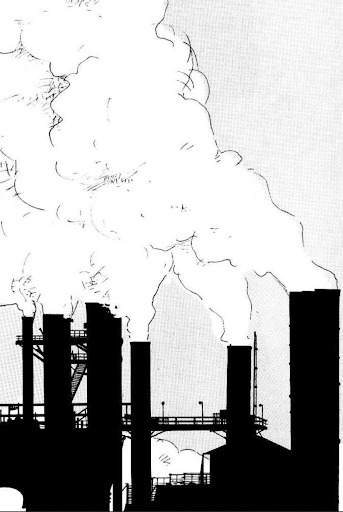
FLCL is a hodgepodge of cultural symbols and River’s Edge certainly part of the, uh, hodge. The parallels end there though – River’s Edge is *peak* josei in that it is utterly engulfed in the edgy drama of its high school protagonists. There is no way around the fact that this just isn’t a very good story, when it has plotlines such as boyfriend of Haruna, the main character:
1: cheating on her with her close friend,
2: which they do while doing hard drugs together,
3: resulting her getting knocked up,
4: which her hikikomori sister finds out via reading her diary (the 90’s!)
5: prompting them to get into a *knife fight*, the wounds of which abort the baby
And that is the most tame of these plotlines, trust me. By the time the gay character’s fake-but-she-doesn’t-know-it girlfriend *immolates herself* for attention you are willing to flee to the nearest monastic order to just chill out for life. This manga is 14 chapters y’all, you can finish it in under an hour, there is not enough character screen time to justify this level of drama. Its a classic early-adolescent fiction problem; your first time hearing about sex and death is so cool! So *real*! But once the novelty wears off there are no characters underneath, the shock is a magician’s misdirect so you don’t notice the hollowness behind the curtain.
We also forget how much the digital revolution has changed art in fast-paced, low-cost genres like manga by allowing consistency and polish; Okazaki is an accomplished, well known mangaka and some of these panels are so messy and detail-less:
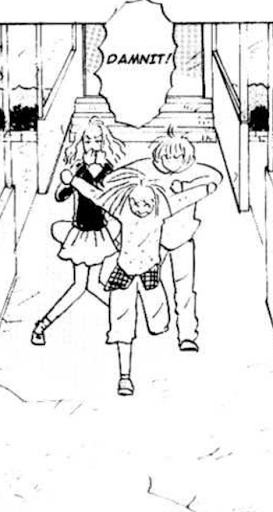
Which isn’t a criticism per se as this was what the genre looked like at the time, and much of the art is great, but it's just to say overall this isn't a visuals-first affair. It relies on writing that just doesn’t deliver.
------
At least most of the time, because in its overwhelmingly maudlin current are ripples of some really good moments. My standout is when the narrator voice goes poetic, setting up a repeated motif:

Even as it is a bit cheesy this motif still spoke to me, the “flat battlefield”, the power of that phrase the story imbued into it. A fight with no contours to its course, no metrics to measure victory by? You don’t need to experience a knife-fight abortion to get that struggle, my daily mundane life is that (obliquely, through a certain lens at a certain time when the mood is just right/wrong). That is the universal feeling of ennui and social displacement these kinds of stories aim to have empathy for, and that the rest of this story failed to achieve. And credit where it is due – main girl Haruna, who narrates this and through whose eyes most of this story happens, doesn’t really have much drama at all in comparison to her peers. While they do insane shit she just watches and helps where she can from the sidelines, defined by her listlessness as opposed to everyone else’s tragedy. The flat battlefield is exactly the kind of pain someone like Haruna would feel – this arc works.
From the social critic lens, what I think is more notable about this story is what it does not contain. Its universal aspirations are betrayed by how utterly of its time it is. River’s Edge falls into the edgy-punk sphere, but original punk was defined by its targets - The Man, The Establishment, the polluted cityscapes and imprisoned activists, Thatcher’s & Reagan’s right wing triumphalism, original punk knew what it stood against. In the post cold-war, mass-culture era of the 90’s, however, the appeal of those causes faded – how could things so distant and so temporal be the cause of such deep personal ills? It's often said that Japan predicts America’s cultural movements ten years out, but in this case it was right on time – 1993’s River’s Edge flows neatly alongside the 90’s American counterculture void.
But we no longer live in those liminal 90’s, that void between the intensity of the 60’s+ social revolution and today – we now have causes, but they are, ahem, as personal as they are political. Sad edgy teens are no longer sad or edgy – they instead fall somewhere on the Depressed/Oppressed axis, their condition diagnosed. Alienation is now a mental health issue (with treatments, certainly always effective yep yep, criminally underfunded and denied to those who need them), gay teens struggle for acceptance as a political cause. Even if the problems are inwardly focused, the solution can be translocated outward – change media, change language, change executive leadership, only then can the struggle be resolved. It’s the grand cycle of history – the teen edginess is activist again, even if the targets are wildly different.
River’s Edge never mentions the word ‘depression’. No one mentions therapy, or acceptance, or really any solution to their various problems - the problems are experienced internally but exist externally, a world broken only by a vague sense of ‘modernity’, if anything at all. The language in which this state of mind is discussed is now antiquated, a sort of radical acceptance of hopelessness as the natural state of man. Its aspirations to universalism have already been left in the dust of the changing times, an ill-fitting, out-of-fashion way of thinking even as Depression Fics dominates its former niche.
Which is why this otherwise-silly story still spoke to me, as I still resonate with that way of thinking more than anything else in vogue. I keep being told something is out there, but all I ever see is an endless horizon - and I am glad to once again share the view.
------
Anyway, happy 30th anniversary to Smells Like Teen Spirit!
#River's Edge#essay#I don't read too much manga but I do aspire to change that#this probably ranks an 8 on the 'insufferable writing' scale but I had fun with it regardless#90's nihilism
85 notes
·
View notes
Text
For the people who are out there “fighting the good fight” and “trying to make fandom a better place,” I have two important questions for you:
1. Is the author dead? x
2. Is your baby in the bathwater? x
What do I mean by those things? Let’s start with #1. The Death of the Author is a type of literary criticism, the extreme cliff notes version of which is that art exists outside of the creator’s life, personal background, and even intentions. I’m using it slightly differently than Barthes intended, but that’s okay, because the author is dead and I’m interpreting his work through my own lens.
In fandom, the author is dead. In fact, the author was never alive in the first place, not really. The author has only ever been the idea of a person, because unlike published fiction, the only thing we know about a fanfic author is that which they choose to tell us about themselves.
Why is that important?
Because it might not be true. Hell, that happens in real life with published authors, who have SSN’s on file with their publishers, who pay taxes on the works they create and have researchable pasts. If the author of A Million Little Pieces could fake everything, why can’t I? Why can’t you? Why can’t the writer of your favorite fic in the whole wide world?
Stop me if you’ve heard this before: “you can only write about [sensitive subject] if [sensitive subject] has happened to you personally, otherwise you’re a disgusting monster that deserves to die!!” Or maybe “you can only write [x racial or ethnic group] characters if you’re [x racial or ethnic group] otherwise you’re racist/fetishizing/colonizing!”
You can play this game with any sensitive subject you can come up with. I’ve seen them all before, on a sliding scale of slightly chastising to literal death threats.
Now, I could tell you that I’m a white-passing Latina whose grandmother was an anchor baby. I could tell you that I speak only English because my family never taught me to speak Spanish, something which I’ve been told is common in the Cuban community, though I only know my own lived experience. I could tell you that I’m mostly neurotypical. I could tell you that I’m covered in surgical scars. I could tell you lots of things.
Are any of these true? Maybe! I could tell you that my brother has severe mental development problems, so uncommon that they’ve never been properly diagnosed, and that he will live the rest of his life in a group home with 24-hour care. Is that true? Am I allowed to write about families struggling with America’s piss-poor services for the handicapped now?
Am I allowed to write about being Cuban? After all, I did just say that I’m Cuban. But is it true? Can I instead write a character that’s Panamanian? Maybe I really am Panamanian, not Cuban. Maybe I’m both. Maybe I’m neither. Maybe I’m really French Canadian. Should we require people to post regular selfies? I can’t count the number of times I’ve had someone come up to me speaking Arabic, and I’ve been told that I look Syrian. What’s stopping me from making a blog that claims that I am Syrian? Can you even really tell someone’s race and ethnicity from a photo?
Am I allowed to write about being a teenager? Am I allowed to write about being a college student? Am I allowed to write about being an “adulty” adult? Can I write a character who’s 40? 50? 60? How old am I?
All of this is to say: you can’t base what someone is or is not “allowed” to write about on a background that may or may not be real. No matter how good your intentions. And I get it - this usually comes from a place of well-meaning. You’re trying to protect marginalized groups by stopping privileged people from trampling all over experiences that they haven’t suffered. I get that. It’s a very noble thought. But you can’t require a background check for every fic that you don’t like.
If you say “you can only write about rape if you’re a rape victim,” then one of three things will happen:
Real survivors will have to supply intimate details of their own violations to prevent harassment
Real survivors will refuse to engage and will then have to deal with death threats and people telling them to kill themselves for daring to write about their own experiences
People who aren’t survivors will say “yeah sure this happened to me” just to get people to shut up
Has that helped anyone? I mean really - anyone??
So now let’s get to point #2: is your baby in the bathwater?
If your intention is to protect marginalized people from being trampled upon, stop and assess if your boot is the one that’s now stamping on their face. Find your baby! Is your baby in the bathwater? Which is to say: find the goal that you’re advocating for. Now assess. Are you making the problem worse for the people you’re trying to protect? Does that rape victim really feel better, now that you’ve harassed and stalked them in the name of making rape victims feel safe?
Let’s say you read a fic that contains explicit sex between a 16 year old and a 17 year old. Is this okay? Would it be okay if the writer was 15? 16? 17? Should teenagers be barred from writing about their own lives, and should teenagers be banned from exploring sexuality in a fictional bubble, instead of hookup culture? Is it okay for a 20 year old to write about their experiences as a teenager? Is it okay for a 20 year old to write about being raped at a party as a teenager? Is it okay for a 30 year old? How about a 40 year old? Is it okay so long as it isn’t titillating? Is it okay if taking control of the narrative allows the writer to re-conceptualize their trauma as something they have control over? Is it okay if their therapist told them that writing is a safe creative outlet?
Is your author dead?
Is your baby in the bathwater?
Now let’s take a hardline approach: no fanfiction with characters who are under 18 years old. None. Is the 16 year old who really loves Harry Potter and wants to read/write about characters their own age better off? Should they be banned from writing? Should they be forced to exclusively read and write (adult) experiences that they haven’t lived? Will they write about teens anyway? Should they have to share it in secret? Should 16 year olds be ashamed of themselves? Should we just throw in with the evangelicals and say that the only answer is abstinence, both real and fictional?
Let’s say that no rape is allowed in fiction, at all. None. What happens to all the hurt/comfort fics where a character is raped and then receives the support and love that they deserve, slowly heal, and by the end have found themselves again? Are you helping rape victims by banning these stories? Are you helping rape victims by stripping their agency away, by telling them that their wants and their consent doesn’t matter?
Is your baby in the bathwater?
Fandom is currently being split in two: on one side, the people who want to make fandom a “safer” place by any means necessary, even if that means throwing out all of the marginalized groups they say they want to protect - and on the other, people who are saying “if you throw out that bathwater, you’re throwing the baby out too.”
The whole point of fandom is to be able to explore all kinds of ideas from the safety and comfort of a computer screen. You can read/write things that fascinate you, disgust you, titillate you, or make your heart feel warm. This is true of all fiction. People who want to read about rape and incest and extreme violence and torture can go pick up a copy of Game of Thrones from the bookstore whenever they want. Sanitizing fandom just means holding a community of people who are primarily not male, not straight, not cis, or some combination of those three, to higher and stricter standards than straight white cis male authors and creators all over the world.
There is nothing you can find on AO3 that you can’t find in a bookstore. Any teenager can go check out Lolita, or ASOIAF, or Flowers in the Attic, or Stephen King's It, or Speak, or hundreds of other books that have adult themes or gratuitous violence or graphic sex. The difference is that AO3 has warnings and tags and allows people to interact only with the types of work that they want to, and allows people to curate their experiences.
Are these themes eligible to be explored, but only in the setting of something produced/published? Books, movies, television, studio art, music - all of these fields have huge barriers to entry, and they’re largely controlled by wealthy cishet white men. Is it better to say that only those who have the right connections to “make it” in these industries should be allowed to explore violence or sexuality or any other so-called “adult” theme?
Does banning women from writing MLM erotica make fan culture a better place?
Does banning queer people from writing about queer experiences make fan culture a better place?
Is M/M fic okay, but only if the author is male? What if he’s a trans man? What if they’re NB? Who should get to draw those lines? Should TERFs get a vote? What if the author is a woman who feels more comfortable writing from a male character’s perspective because she’s grown up with male stories her whole life, or because she identifies more with male characters? What about all the trans men who discovered themselves, in part, by writing fanfiction, and realized that their desires to write male characters stemmed from something they hadn’t yet realized about themselves?
How can we ever be sure that the author is who they say they are?
Who is allowed to write these stories? How do we enforce it?
Is it better for none of these stories to ever exist at all?
Have you killed your author?
Have you thrown out your baby with the bathwater?
49K notes
·
View notes
Note
Stop acting like your boy is innocent.
There is a 1864 flashback in 2x15 where Stefan is feeding on several women (three or four) in lingerie (people in 1864 don't wear modern underwear like bras, what they were wearing was lingerie at the time, it was highly indecent to be dressed like this in the 19h century, especially around a man), it's implied he compelled them to undress and to be okay with him feeding on them and taking pleasure in it because they were really happy about it. There's even one of them lying on the sofa. We can understand what Damon and Katherine did based on context (this situation is similar to Damon and Andi or Isobel and her assistants, this is a pattern in TVD, vampires with human people in underwear are all implied to be their rapist), so can we for Stefan. Ironically it's newbie vampire Damon who compelled these women to leave, and Stefan was aware of what he was doing, because when Damon said it was too much and he was going to leave Stefan begged him to stay. I also remembered that when Damon arrived, Stefan threw a woman at him and she caressed him. Women don't need to be in lingerie for a vampire to feed on them (ex :1912 flashback in 3x16, the women were not in lingerie), there is an intended message. When Stefan explained it to Elena, she told him "sounds like you were Damon", and Stefan said "I was worse than Damon. »
Case 2 : the women in the 1920s : There is a dodgy line in his diary in S3 which mentions his days in the 1920s when he says he wakes up in strangers’ blood with women he doesn't recognize. The mention of "women" isn't innocent, because it's canon that rippers don't feed only on women, we have seen Stefan feed on little kids too. The show also made it a point that he chose to have an apartment in Chicago next to an all-girls high school, which shut down for attendance issues, I think you can guess why...
I'd like to add that absolutely no one really took accountability in the show, every rape case was swept under the rug :
This is the last post I’m making about this.
Stefan without humanity is sadistic and he’s a murderer I’ve been very upfront with that, he toys with people - including women - before killing them but there is a separation between TVD being like, what would look sexy and erotic and disturbing onscreen

a la


(trying to go for this kinda thing which was an endorsement someone did for the Dracula trailer: The vegetarian vampire is dead, long live his non-sparkling counterpart! Yes, let our vampire stories have some bite. Let us get back some of that danger, some of that seduction of evil, and dare I say it? Let us have blood. Rivers of Hammer Horror technicolor blood. Blood, blood, everywhere, and all the drops to drink.)
and what Stefan as a character does, especially considering that Julie was going for a certain aesthetic:
“There was a sensuality and a seduction to the vampire genre that now, [nearly] 10 years later, isn’t necessarily as sexy, right?” she says, alluding to the fact that vampires can be compelling or glamorous to humans (depending on whether you’re watching TVD or True Blood) and have overpowering strength and speed.
Stefan gorges on blood, the woman on the couch is dead.

Her being in lingerie is for aesthetic, when he goes to his next victim, he bites her immediately, because even if he is playing games, Stefan’s desire is always about this:
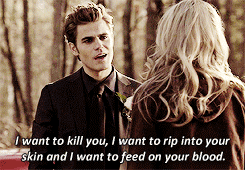
like the twister game, it’s about feeding


so him choosing to stay across the street from an all girls school means that he played the same type of games or that he has preferences
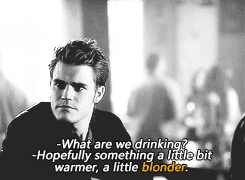
but even in this, it’s about the feed although it’s made to look like it could be a makeout until closer examination:

The show in general did have a tendency to skew towards female victims when they wanted to illicit a certain image of disturbing eroticism:
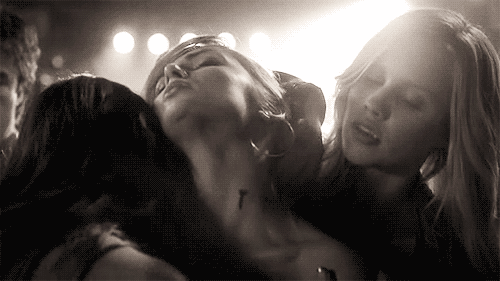
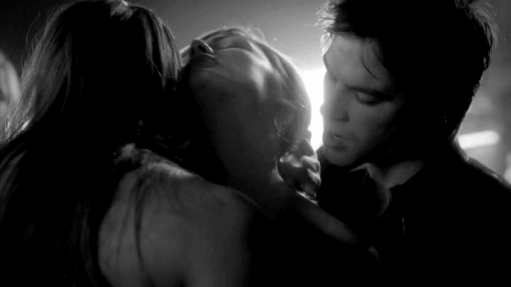
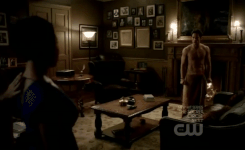

whereas male victims were always rage or functional:
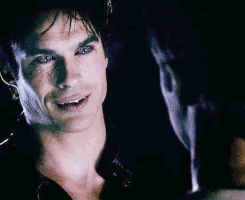


(which isn’t to say female victims were always used to illicit eroticism). The diary entry is easy to split hairs about
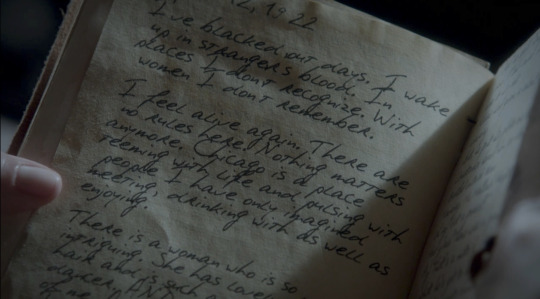
Stefan is the one who doesn’t recognize the women he’s with, there’s nothing to suggest that anything was coerced, particularly since in the same entry, he refers to Rebekah as a ‘woman’ so who’s to say that they aren’t other vampires he doesn’t recognize
There’s also the way it was written, which can suggest that each sentence is a different occurrence i.e. there were days he woke up in strangers’ bloods[period] in places he doesn’t recognize [period] with women he doesn’t remember [period].
This really just depends on how you want to interpret it.
I do agree that the show in general did have a problem with rape culture, which JP admitted:
“And you could look at it back through the lens of say the #MeToo movement and object to what may be a little bit of a glorification of a rape culture, but what we were working with at the time was a gothic romance with a fine line — a very fine line — separating it,” she says with a laugh. “And I used to get in arguments about it being a gothic romance and not wanting to censor the sexuality of the characters, even if it felt a little questionable at times, like specifically Damon and Caroline in the first couple of episodes [when he used her as a plaything and drank from her against her will]. Because that’s what vampires represented, and that’s what vampires were. And the culture has just shifted enough that you’d have to think twice before you dove in that boldly now, I think.”
But in this context, the issue with Stefan would then be the framing of his murders and how they were made to look erotic and not Stefan as a character being a rapist.
Not to mention, considering that at the time, JP doubled down on what Damon and Katherine did, if there was “sex” involved with Stefan’s feeding then we would just get a scene like this
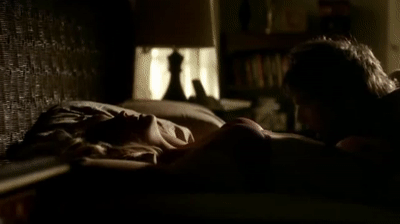
or this

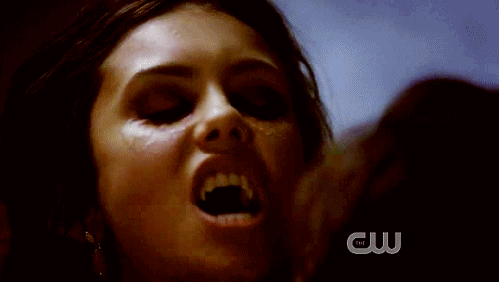
or even this

There would be no reason not to.
Anyway, I’ve written about this more than I care to at this point, so.
41 notes
·
View notes
Text
*Nixon’s Rhetorical Narratives*

https://www.irishtimes.com/opinion/world-view-the-ghost-of-richard-nixon-invoked-by-the-trump-campaign-1.2739390
Below I will examine an artifact and discuss what narratives are being told within it through a rhetorical lens. I will also be looking at the different values that are associated with this narrative, both through inclusion and exclusion. Lastly, I will evaluate the impacts on society that the narratives have and whether they are more productive or unproductive.
For the purpose of this analysis, I will be studying U.S. President Richard Nixon’s resignation speech on August 8th, 1974. In his speech, Nixon attempts to deflect the negative press and blame he’s received constantly by humanizing himself in a character narrative, uniting his audience under a patriotic narrative, and referring to the Watergate scandal very little, which separates it from his character narrative. This dodging of responsibilities at the last second of his presidency is overall unproductive because he doesn’t address some of the audience’s main concerns with him very deeply and this can leave them feeling confused.
United States President Richard Nixon was re-elected into office in 1972. However, he tarnished his public image by becoming involved in the highly discussed Watergate scandal. The scandal arose from an attempt to conceal his involvement in office break-ins of the Democratic National Committee. In order to avoid impeachment, he became the first and only president to resign from the position. This speech culturally serves as a culmination of all of his time serving the public, and it would be his last big mark to leave on the country as a whole (whitehouse.gov).
The argument will be based on the narrative theory created by Sonja K. Foss. She proposed that there are four ways to separate narratives from other rhetorical forms. The first is that narratives have at least two events that are either “active” or “passive”. They are also unique because the events are established in time order. The third characteristic of a narrative is that each event has to relate to another in some way. This helps spin the story for the rhetor and it makes the events much easier to follow for the audience. Lastly, all of the events in the narrative have to relate to the same topic. Narratives have to be continuous and lay out events just like a typical story would (Foss, p. 334). In the case of Nixon, he ties together multiple events that happened during his presidency and directs his audience to look into the future of America, with the uniting topic being himself.
Throughout the speech, Richard Nixon attempts to sculpt a more gentle character narrative by highlighting the emotional impact that his position as President has had on him. For example, towards the middle of his speech, he reaches out to his close companions by saying, “To those who have stood with me during these past difficult months, to my family, my friends, to many others who joined in supporting my cause because they believed it was right, I will be eternally grateful for your support,”. He uses the important words “family” and “friends” to bring himself down into the realm of life that his audience lives in. Often, people will view the President as a standalone character on a screen giving a speech or starring in hundreds of news articles every day. Showing that he has family and friends draws a similarity between himself and his audience and makes him feel more relatable almost instantly. It showed that even the most powerful person in the country needs emotional support, and this can blur the lines of anger and distrust within the audience.
Nixon also attempts to unite the audience under the narrative of a United America in an effort to change that positive emotion into deflection. As an example, he very quickly follows up his discussions of family and friends with the statement, “So, let us all now join together in affirming that common commitment and in helping our new President succeed for the benefit of all Americans,”. He reminds his audience of another commonality between him and his audience: the American identity. This identity is very important because it calls for loyalty and selflessness. These identity implications are used by Nixon in a way to secretly ask the audience to not dwell on his actions and only focus on making a better future with the next President. This loyalty to the country and the call to action to look towards the future of America directs attention away from his controversial actions.
Lastly, Nixon only very briefly discusses the Watergate scandal, the main reason why he was resigning in the first place, as a way to deflect from his actions and downplay the event as a whole. He addresses the scandal at the very beginning of the speech by saying, “I have concluded that because of the Watergate matter I might not have the support of the Congress that I would consider necessary to back the very difficult decisions and carry out the duties of this office in the way the interests of the Nation would require,”. In this case, it’s more important to look at what was not said rather than what is being said. While he does link the Watergate scandal to his resignation through the mentioning of congressional support, there is no insinuation of guilt or any hint at an apology in the statement. It was also very brief and placed at the beginning of the speech to give the audience time to forget about the topic as Nixon moves on to address other points. The brevity of the Watergate discussion and its placement at the top easily lets Nixon brush the topic aside and prepares the audience for other ideas instead.
The extremely prominent nature of Presidential speeches lends them to plenty of analysis and criticism from their audiences. Richard Nixon’s resignation speech was no exception. The author Richard A. Katula contributes to this discourse by claiming that “Nixon’s defensive strategy became denial of intent,” (Katula, p. 2). He goes on to explain that Nixon takes the stance of always having his country’s best interests at heart. This supports the idea that the resigning President was attempting to deflect his involvement in the Watergate scandal and move past it as quickly as he could. This can be seen when Nixon says, “I would say only that if some of my judgments were wrong — and some were wrong — they were made in what I believed at the time to be in the best interests of the nation,". Katula argues that this is the moment when the president shifts the burden of the scandal off of his back (p. 2). Nixon attempts to absolve himself of wrongdoing by forcing the audience to think about the greater good of the country as a whole.
This speech, while effective at meeting Nixon’s own goals of leaving on a positive note and slightly repairing his image with the public, was generally unproductive to society as a whole. Nixon was approaching a largely upset and skeptical audience who likely had a lot of questions about his actions. The most ethical approach to this resignation would be to give a summary to the audience about what the switch in power would look like and how it would affect them, as well as clear the air about his involvement in the Watergate scandal. That would have provided the audience with the most valuable information possible for the time and it would prepare them more for changes coming in the future. Instead, he took the approach of trying to make the audience feel united and in the same way, making his controversies appear smaller. While this was ultimately rather effective, it would have been more effective to simply inform the audience of what was happening.
Nixon’s presidency was colored by scandals and drama, and he will always be known in the history of the United States as the first president to resign from office. Despite this, he attempted to leave on a positive note and direct the audience away from all the negativity that surrounded his public character. He did this through multiple narratives, the first one discussing his character and making himself appear more real and relatable. The second way was through redirecting the audience’s energy into patriotism. The last way was by not dwelling on the Watergate scandal and leaving an absence of guilt or blame. These narratives were very effective, but not necessarily the most productive for society.
Works Cited
Foss, Sonja K. “Narrative Criticism.” Rhetorical Criticism: Exploration and Practice, Waveland Press, Inc, Long Grove, IL, 2004, pp. 333–343.
Katula, Richard A. “The Apology of Richard M. Nixon.” Today’s Speech, vol. 23, no. 4, Taylor & Francis Group, 1975, pp. 1–5, https://doi.org/10.1080/01463377509369193.
Nixon, Richard. “President Nixon's Resignation Speech.” PBS, Public Broadcasting Service, https://www.pbs.org/newshour/spc/character/links/nixon_speech.html.
“Richard M. Nixon.” The White House, The United States Government, 15 Jan. 2021, https://www.whitehouse.gov/about-the-white-house/presidents/richard-m-nixon/.
2 notes
·
View notes
Text
Thanks to that IG Live and Miranda we now know that there was a scene filmed where Zelda did summon Baron Samedi to ask for Sabrina, that she wants to bring Sabrina back at “whatever the cost”. So naturally my brain won’t let this go...
I won't claim to know anything about Baron Samedi or that culture. I myself am an American with Irish and German genetic makeup. So I won't try to get into the vodou aspect. I am however well versed and studied in literature and story telling. So keep in mind that is the lens with which I'm looking at this through.
It is no surprise that Zelda would use the dice to ask for Sabrina. Sabrina is someone Zelda sees as her own daughter, loves her with that same fierceness. And Zelda has never been someone afraid to cross a line. So for her there is no limit to what she would do, what she would offer to get Sabrina back.
The natural choice/option would be a soul for a soul, a life for a life. I really don't think, outside of Hilda and Ambrose, that there is anyone Zelda wouldn't be willing to murder if she thought she could have Sabrina. Nor do I really think Baron Samedi (or at least the part that is Marie) wouldn't know that, nor would they ask Zelda to give up Hilda or Ambrose. The next and obvious choice that comes to mind is Vinegar Tom. But I am hesitant to say that he would be the one in that he was offered as a gift. Not to mention the life of a familiar doesn't seem equal to that of Sabrina, a witch and Morningstar heir. While yes I think Zelda would give up Vinegar Tom, no matter the heartbreak she felt for it, I don't think it would cut it. It has to be a person. It has to be an offering that would entice Baron Samedi.
I believe the price is Zelda herself.
We have seen before the lengths Zelda will go to defend and protect her family, to keep them standing.
Zelda was prepared to be a sacrifice for the Feast of Feasts, outright told Sabrina she wouldn't have allowed it to be Sabrina. When she is told that Lucifer wants Sabrina as his queen, Zelda does not hesitate to insist she won't let it happen. Certainly. When Ambrose is going to be executed and Sabrina not far behind him in line, Zelda goes back to Faustus and pretends she is still under the Caligari curse. Now I know the show sort of glazed on past the significance of that; Zelda herself showed no fear in it. But there is no doubt in my mind that going back to her husband who had put her under a spell to control her, complete control mind you, while he paraded how he was going to murder the kids she raised didn’t require such an epic amount of self-sacrificing strength utterly unmatched. When it comes to her family, Zelda Spellman gladly puts her life on the line time and time again.
And do you think Baron Samedi aka Mambo Marie, the person who upon coming to Greendale immediately latched onto Zelda, wouldn’t be interested and enticed by such an offering? Me thinks not.
So Zelda gives herself in order for Sabrina to live.
You know who I think would have a huge problem with that? (Besides her family, duh.) Hecate.
So now in my mind I have Sabrina, resurrected and ready to fight to get her auntie back, now ready to be Hecate’s sword. And if along the way Sabrina reaches out to Lilith for assistance, makes a deal not to challenge Lilith or her son for the throne of Hell, then why not? GIrl gang!
If you read all of this, thanks!
40 notes
·
View notes
Photo

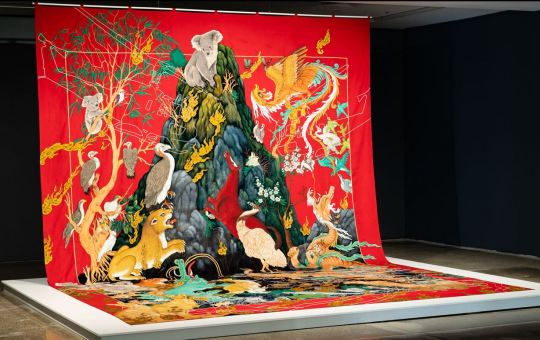
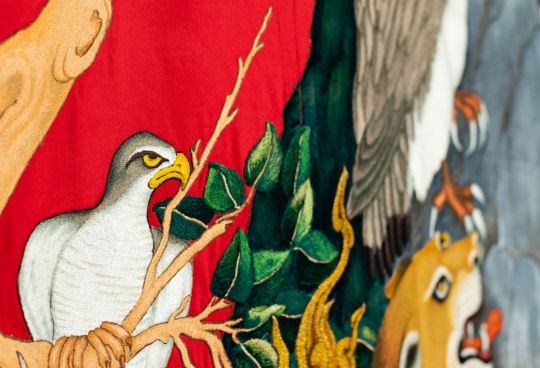
Kadim Ali b. 1978, Pakistan; lives and works in Sydney Australia
Sermon on the Mount (2020)
Linen, cotton, nylon, ink, natural dye, synthetic dye, acrylic paint; painting, hand and machine embroidery, appliqué 557 x 397.5cm
Born 1978 Quetta, Pakistan, Khadim Ali currently lives and works in Sydney, Australia. After growing up in Pakistan as a refugee, Ali was trained in classical miniature painting at the National College of Arts in Lahore and in mural painting and calligraphy in Tehran.
1 ima.org.au “I became other. I became one of the wearied, dusty faces from across the border. And although there was no boundary between us, and we were all citizens of one country, suddenly an invisible border of horror was drawn around me that made it impossible to get out” Khadim Ali
In his largest Australian solo exhibition to date, Hazara artist Khadim Ali explores the normalisation of war and the experience of refugees through a series of poetic installations and textile works. Invisible Border comprises sound installation, miniature painting, and a monumental 9-metre-long tapestry, hand woven by a community of Hazara men and women, some who have lost family members in war. Featuring existing work alongside new commissions developed for the IMA, the exhibition will also feature Otherness, a major body of work developed in partnership with the IMA and Lahore Biennale Foundation.
Ali’s interest in tapestries developed soon after his parents’ home in Quetta, Pakistan was destroyed by suicide bombers. Amongst the rubble and debris left from the blast, a collection of rugs and weavings remained the only thing intact: miraculously able to withstand the reign of terror inflicted upon his family and community. In this new large-scale tapestry, and other works, Ali explores the impact of war, trauma and displacement drawing parallels from the Book of Shahnameh, a Persian literary masterpiece comprising of 50,000 couplets and written between c. 977 and 1010 CE.
Just like the many great mythic tales in the Shannameh, Ali’s intricate works depict stories of demons and angels, conquest and war through the lens of the persecuted Hazara community. Expressing the profound grief, trauma and loss experienced at the hands of modern-day warfare, Invisible Border is a necessary and vital exhibition during a time of political propaganda, violence, and fear.
2 ima.org.au Ali’s interest in tapestries developed soon after his parents’ home in Quetta was destroyed by a car bomb. Amongst the rubble and debris left from the blast, a collection of rugs and weavings remained the only items intact: miraculously able to withstand the reign of terror inflicted upon his family and community. In these new large-scale tapestries, Ali makes comment on war, geo-politics and personal trauma, drawing from a range of historical and contemporary influences including the recent Black Summer bushfires, Persian literary masterpieces, children’s fables and the Mughal Dynasty.
Expressing the profound horror, grief and loss experienced under modern-day warfare, Invisible Border is a necessary and vital exhibition during a time where political propaganda, violence, and fear pervades global relations.
3 Daisy Siddal inqld.com.au Ali has lived in Australia since 2009, nominated to arrive on a distinguished talent visa by then QAGOMA Director Tony Ellwood. Ali has worked between Australia and Afghanistan ever since.
Ali’s most recent work, Sermon on the Mount, adopts inspiration from the Bible and the Black Summer bushfires to generate a criticism of the experience of climate change.
Ali, who lives in Sydney’s inner-west, said his home was 40km away from the Black Summer bushfires.
“During the black summer we had horrible smoke. We were barely able to breathe. I was looking at the smoke and it was nostalgic, reminding me of the war,” he said.
“It reminded me of the stories people told when fleeing from a town that was set on fire, saying there was smoke on the mountain.
“The people who set their villages on fire, the Taliban and Al-Qaeda, they were considered a terrorist organisation. What do you call the corporations who caused climate change and set fire to a significant part of the forest of Australia?” he said.
IMA [Institute of Modern Art, Brisbane] Executive Director and exhibition curator Liz Nowell said she was thrilled to present Ali’s largest exhibition to date, in his adopted home of Australia.
“Khadim Ali is without a doubt one of Australia’s most acclaimed artists. His thought- provoking and poetic works have been seen all over the world: from the Guggenheim in New York to the Venice Biennale,” Ms Nowell said.
“Through intricately constructed textiles that draw on literature, traditional art forms, personal narratives and global politics, Invisible Border speaks powerfully to the experience of displaced peoples everywhere.”
4 guggenheim.org Born in 1978, Khadim Ali grew up in the border city of Quetta, Pakistan, near the border with Afghanistan. Trained in the art of contemporary miniature painting at the prestigious National College of Art in Lahore, Pakistan, and in mural painting and calligraphy at Tehran University, Iran, Ali is inspired by his rich cultural heritage and employs traditional artistic techniques to convey the complex history of this region. His work provocatively confronts the social and religious prejudice his family has faced and considers its effect on the writing of history, particularly during wartime.
5 ima.org.au Since relocating to Sydney twelve years ago, Ali has begun incorporating quotidian Australian iconography such as eucalyptus, currency and kangaroos into his work. Sermon on the Mount (2020) is an example of the artist’s evolving visual language. A direct response to the 2020 Black Summer bushfires—which devasted much of Australia’s bushland—the work depicts a cast of animals and mythical creatures seeking refuge atop a mountain engulfed in flames. The title of the work, Sermon on the Mount, makes direct reference to a series of teachings attributed to Jesus Christ, and widely considered to contain some of his most important messages.
This composite tapestry, which was initially constructed as a digital collage, is the artist’s reimagining of a 15th century illustration from the Anwar-i Suhayli. Widely considered a masterpiece of world literature, the Anwar-i Suhayli (also known as Kalīla wa-Dimna, in Arabic, or Panchatantra in Sanskrit) is a collection of fables describing animals as heroic creatures.
In the original drawing, held in collection of the British Museum, a crow addresses a group of birds to rally their support against a leader of the owls. In Ali’s version, the crow is replaced by a koala, who is seen towering above a cluster of animals as she delivers a prophecy that foretells the destruction of mother nature at the hands of humankind.
While watching the fires unfold on the evening news, Ali was overcome with a deep and pervasive fear, which he likens to his experience living in a conflict zone.
As the artist himself states ‘The bushfires reminded me of the violence I spent my life trying to escape. At the same time as the Taliban burns people and their homes to the ground, a fire—only 40km from my house in Sydney—decimated whole species and blackened thousands of hectares of bushland. As the newsreader described animals feeling for their lives, I recalled whole villages hysterical and panicked as they tried to escape fire. So, what then, should we call these people—these corporations—who are destroying our natural world and quite literally scorching the ground we walk on?’
9 notes
·
View notes
Text
Be wise enough to wonder. Be brave and let it go.
Mark had no idea what time it was when he was woken up by the sound of his daughter crying. He heard an exhausted groan beside him as Cristina moved to pull herself up. Mark put a hand on her shoulder to stop her.
"No it's alright," he whispered, his voice hoarse from sleep. "I'll go."
Two months ago Cristina had given birth to their first daughter. Her name was Gianna She was the biological product of Kieran and Cristina with her pointy ears and blue hair that changed with her moods, and Tina's chestnut coloured eyes and copper skin. But the trio fully considered her to be theirs. Blood was unimportant.
Mark was half asleep as he stumbled his way down to the room they had set up Gianna's crib in. He missed Kieran and he knew Cristina did as well. Kier was currently stuck in Faerie with his royal responsibilities. Cristina and Mark were visiting the LA institute to help with a recent uptake in demon activity around the area. It was amazing to see his siblings again (minus Ty, he was in Devon visiting Kit since the two of them were now dating long distance.) However he knew it was strange for Gigi to be sleeping in an unfamiliar environment.
Hence lots of crying.
Mark heard his daughter's crying getting softer as he came to the doorway. He could also hear another voice, cooing to her, calming her down. As he got closer he could see it was Helen. Mark smiled at the sight of his big sister gently rocking his daughter in her arms.
"Thank you" he whispered, trying not to startle her or wake Gianna. Helen was wearing her sleep clothes, with her hair tied back. There were also very prominent dark circles under her eyes.
"You should get some rest" Mark said as forcefully as he could without raising his voice. "Seriously you look exhausted Len, hand her over and he back to bed." Helen just gave him a stern look. The one that she used to use when he was trying to sneak extra cookies as a kid, or the first time she caught him trying to come home past curfew after being out at a downworlder party that he was way too young for.
The funny thing was that even though Helen had started calling Eleanor "mom" around the age of 8, Mark had never been able to do it. It had absolutely nothing to do with an attachment to his birth mother. He barely remembered her. Maybe it was because he had always had someone looking out for him since day one, and that person wasn't Nerissa or Eleanor.
And it certainly wasn't his father.
I think you're punishing yourself, is what Helen had told him one night. You're punishing yourself for being different, so you won't let yourself get attached.
Helen placed Gigi back in her crib and put her hands on Mark's shoulders. "Sweetheart you are more exhausted then I am" she reprimanded him gently. "You and Cristina both need help and I'm more than happy to do it." Mark put his hand over hers, gripping onto Helen to avoid passing out.
"She has Kieran too remember?" He insisted firmly. "Just because he isn't here right now doesn't mean that he's not her dad too." Helen's eyes widened.
"Oh no! No that wasn't what I was saying at all." She said frantically. Her voice was starting to slur a little like she was drunk. She really needed to go to sleep. "I was just trying to be useful you know? Like I always used to when we were younger."
Mark knew what she was referring to. When the twins were born, in order to help out Eleanor and their dad, Mark and Helen starting taking care of them so their parents could get more sleep. Julian was still very young, only two, so it was up to them as the older siblings to step up.
Livvy was a relatively easy baby. She cried when she was hungry or needed changing, and then she was fine. She was pretty good at sleeping through most of the night as well. Ty on the other hand was not. When he was drinking formula from the bottle he would only ever take a little and then refuse to eat any more. This lead to him always being hungry half an hour later and as a result, not sleeping for very long.
The family would take shifts when looking after the twins to avoid being too exhausted. But there were some nights where Ty would just refuse to sleep and nobody knew why. Eleanor wanted to go to the silent brothers, but thankfully Helen had talked her out of it.
He's just different, she had said. It's fine, we will figure it out.
At a certain point Andrew had just refused to try, and Helen and Mark had to step in. Unfortunately these were bad habits of Ty's that seemed to have carried over into adulthood. But at least now he could get up and feed himself at 2 in the morning.
Mark shook himself out of his stupor. "No it's ok. I'm sorry. I just worry about you Len" he murmured. Helen shot him a tired smile. "And I you, brother" she replied, slipping into a very fae way of speaking. Mark turned to look at his little girl, who was still sleeping. Thank the angel.
Thank the gods, his brain supplied.
It was interesting thinking about the way she would grow up. It would be so different from Mark and Helen. Gianna had access to Unseelie culture through Kieran, as well as the privilege of being raised by a full blooded faerie. She was already being read fae stories (accurate ones) and sung fae lullabies. She would be taught fae languages by Kieran and Cristina mostly, because as Kieran loved to point out, he was terrible with languages. She would also be taught Spanish and English when she was older.
She would be raised as a shadowhunter and as a faerie in a better, more understanding world that he was trying to help build. Mark couldn't help but be a little envious of her.
He turned back to Helen who hadn't left, but had sat down on the floor, bracing her back against the wall. He sat down beside her.
"Hey" he whispered roughly. "Do you ever feel like we were robbed?"
Helen looked up at him slightly dazed. Her Blackthorn blue-green eyes were starting to glaze over. "Huh?" She muttered sleepily. Helen rubbed her eyes and cleared her throat, trying again. "What do you mean exactly?"
Mark sighed as he slowly felt all of the thoughts and feelings he usually tried to keep buried. He really didn't want to deal with them. Because if he delt with them then he would have to acknowledge what happened, and acknowledging it made it real.
Something that Magnus always said was that you had to go through the pain and not around it, because going through it was the only way to get over it.
Mark took a deep breath and looked Helen in the eye. "I mean think about it. From the moment we arrived at this institute, our father always talked about how evil and wicked and manipulative our mother was. And yes, I would argue from the sound of things he was probably right, but I was four years old and she was the only faerie I had ever known. So it seemed as if everyone around was establishing a baseline of, Faeries. Wicked. Manipulative. Cannot be trusted.
Helen shook her head "but that's not-" Mark interrupted her. "I'm sorry but I'm not done." Helen sighed and looked to be fighting the urge to roll her eyes, but she didn't protest. "Ok fine. Go."
Mark continued. "And the thing is we were bombarded with that information all our lives. From our instructors, from our father, from our peers. So eventually I think you and I started to believe it Len! I think we started to think of ourselves as evil, and in order to not be evil we had to distance ourselves from being fae as much as possible." Mark's voice was beginning to shake.
Helen shook her head. "No I don't think it was that so much as we were trying to prove that we were real shadowhunters. Me personally, I didnt want to be considered a downworlder because I'm not, I'm a shadowhunter. " Helen explained, but her voice sounded unsure. "I didnt want to be treated differently."
Mark chuckled humorously. "But don't you see? We are different! That is precisely my point, and everyone made us feel ashamed of that. Remember how you used to braid your hair like a faerie until girls started making fun of you and trying to pull it out? And then you started wearing your hair to cover your ears. Did you honestly expect me to believe that you preferred the style, sister?" Mark was trying to keep his voice lowered but it was becoming increasingly difficult.
Helen was silent. There was a pause where neither sibling spoke and then Helen's defeated voice. "I don't want to talk about this Mark." He felt a pang of guilt.
"I know. Forgive me please, it was not my intention to upset you." He spoke elegantly. Helen laughed softly. "You know it's weird how much it comforts me, hearing you talk like that" she said.
Mark smiled sadly at her. "But that's exactly my point Helen. I mean think about it? How much did we give up or refuse to pursue just because we were scared? You know I've been reading far stories to Gianna and some of them are actually really incredible. There are stories about brave female warriors who go on adventures to save beautiful princesses and stories of people who couldn't decide which one if their suitors they liked best, so they just chose them all. They are stories about people like us, written for people like us." Mark could feel himself beginning to cry .
Helen reached over silently and placed her hand on his to comfort him. She looked like she was holding back tears as well.
"Imagine" Mark whispered brokenly, tears running down his cheeks. "Imagine what it would have been like if we read stories like those when we were younger.
Helen closed her eyes, trying to block out tears. "We were trying to keep ourselves safe" she whispered. "It was self preservation."
"It was assimilation" Mark said firmly. "And that really wasn't fair." Helen let out a harsh breath.
"And it didn't even do any good," Mark continued. "They still kicked us out."
Helen laughed in spite of the situation. Then let they weight of the conversation wash over them both, soaking them in despair and self pity.
Helen finally broke the silence.
"You know, she began, Magnus Bane loves to share stories about past shadowhunters in a more accurate way because the Clave's records are usually very white and straight washed, and when Aline and I mentioned potentially adopting a child from abroad, he told us a story about this one shadowhunter Ariadne Bridgestock. Apparently she was a lesbian and in a relationship with Anna Lightwood but she was also originally from India. Her parents adopted her and brought her back to England."
Mark shrugged "So? There's nothing inherently wrong with that." Helen gave him another look.
"Well yeah, but the problem was they didn't let her retain anything from her culture and they didn't give her the opportunity to branch out and learn more. They stripped her of all of that and basically taught her to behave like the typical white British girl." Helen readjusted her position, straightening out her back. "He wanted to make sure that if we ended up with a child who had a different cultural background, we would understand the importance of nurturing that connection" she explained.
Mark nodded "Well yes, but Aline would never do anything like that given how important her culture is to her." Helen was silent for a moment.
"Yeah I know. It's just that I'm not exactly the poster girl for self love and acceptance now am I? She said I'm a self pitying tone.
Mark shook his head. "It's not really the same thing though Len" he reasoned.
"No I know that, but it's similar" she mumbled, tiredness seeping into her tone. "Anyways, that's why I'm so happy Gigi has you and Kieran." Helen finally stood up "Especially you. When she feels like her mom is too much of a shadowhunter to get it, and her dad is too much of a faerie to get it, she has her papa to understand her." Helen said wistfully with a smile.
She extended her hand to Mark and pulled him to his feet. They both stared at Gianna who was moving around slightly in her sleep. "Yeah she will be fine" Helen mused softly. "She's got Cristina to teach her spanish and Kieran to teach her faerie. You can tell her stories about the wild hunt and Cristina can tell her stories about living in Mexico." Helen paused, her expression looking a little sad. "Her life is going to be so different from ours."
Mark felt another pang in his chest as well as the boiling of anger beneath his skin.
"How do we get past this?" He whispered. "How do we deal with this Helen? This anger?"
Helen was silent for a moment. Mark turned to face her and noticed she was shaking slightly. Helen gulped and looked up at him.
"We can't feel sorry for ourselves. That gets us nowhere. We need to confront it and then we need to find away to move past it," she said determinedly. "We need to be brave enough to let it go. We can't change the past but what we can do is try and change the way we approach this now. I know it's hard but we can do it." Helen smiled at him "As long as we have each others backs we can get through this."
Mark nodded. "I know. You're right. I want to keep moving forward. I want to learn more, discover more. I want to figure out who I really am." Mark spoke steadily. "The things that happened when we were younger were horrible," he felt his voice breaking again. "It's painful, but we can't just stay on our knees. We have to move on or it'll consume us."
Mark took Helen into his arms and hugged her tightly. She sniffled lightly, wrapping her arms around him. Mark let out a sigh.
"It's ok," he whispered. "I've got you, you're not alone."
You are not the only.
Be wise enough to wonder, be brave and let it go.
Nothing is everlasting.
Have mercy on my soul.
#tda#the dark artifices#tsc#helen blackthorn#mark blackthorn#kierarktina children#kierarktina#kaitlin'swriting
88 notes
·
View notes
Note
I promise I am not sending this in bad faith but it kind of surprises me that so many intelligent and well-read people in the Reylo fandom did not see Ben’s death coming in a mainstream American piece of media aimed family audiences. Unfortunately, a (redeemed) murderous villain settling down with the heroine was never a realistic expectation to have from such a massive franchise. Especially not on screen. But I can see them bringing him back in a book with a niche readership.
Not meaning to be rude, but it 100% was a reasonable expectation to have. Star Wars is (was) very unique among American franchises. It already eschews many models of American storytelling.
The entire Force in the OT is based on your "feelings", a concept ridiculed by modern unsentimental storytelling and culture. Luke is told to "trust his feelings." Luke wins not because he physically overpowers Vader or Palpatine but because he throws away his weapon because violence will only turn him to darkness, declares that he won't fight Vader because he "is a Jedi, like his father before him", and is saved by Anakin coming to his senses and redeeming himself by protecting Luke after Luke shows true love and compassion for his father. The day is not won by punching a guy, as it usually is in American storytelling. The day is won because a son refused to fight and instead merely reminded his father that he loved him.
Star Wars is explicitly based on mythic storytelling as interpreted and given lens by Joseph Campbell. As in, Lucas was friends with Campbell and literally told Campbell so. Lucas intended, very clearly, to make a story in the fashion of old myth. And in the fashion of old myth, old men may die, but youth must live. Lucas even is quoted as saying, "I believe you are redeemed through your children." Ben, being young, being the child in this scenario and not the father, 110% should have lived under SW's original mythic logic.
I have explained why Ben needed to live here in this pre TROS post and I stand by the logic which TROS abandoned and which therefore breaks the integrity of the story. Anakin did not die as Vader because it was punishment. It was framed as a release for an old man who had suffered for twenty years in a broken body. Obi Wan, Luke, and Han dying also do not die to be punished because they are old men who lived their lives fully and now die with purpose. Ben is none of these things and his death is a cynical exception.
It is pandering to the lowest common denominator to act like SW was always this way. Original Star Wars was created explicitly to counter the cynical American storytelling you are talking about.
"Rather than do some angry, socially relevant film…I realized there was another relevance that is even more important — dreams and fantasies, getting children to believe there is more to life than garbage and killing…Once I got into STAR WARS, it struck me that we had lost all that — a whole generation was growing up without fairy tales. You just don’t get them anymore, and that’s the best stuff in the world — adventures in far-off lands. It’s fun.” (x)
"You can’t, and how do you explain a Wookiee to an audience, and how do you get the tone of the film right, so it’s not a silly child’s film, so it’s not playing down to people, but it is still an entertaining movie and doesn’t have a lot of violence and sex and hip new stuff? So it still has a vision to it, a sort of wholesome, honest vision about the way you want the world to be.” (x)
Anyway. I am trying not to be aggressive but I have answered so many asks on this topic in the past. Those of us who insisted that Ben needed to live did not do so with some blind spot in our literary vision. Star Wars, until TROS, was not a Marvel movie, was not an "American story", was very explicitly textually by its creator built on ancient myth and non-cynicism. Ben dying breaks the integrity of this ancient myth logic and it therefore breaks star wars. SW wasn't about, in George's words, "garbage and killing." That it has now betrayed itself isn't my problem or our fault for believing in the shape of George's vision, not sorry.
496 notes
·
View notes